#(edit: it ended up long)
Text
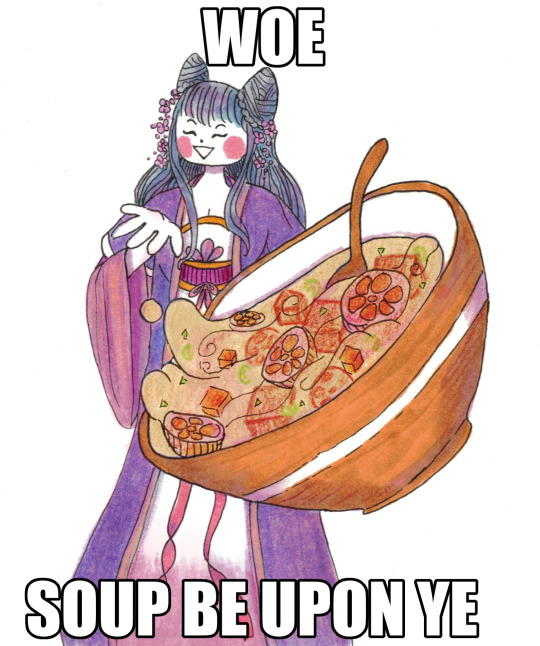
Get Souped!
#poorly drawn mdzs#better drawn mdzs#mdzs#jiang yanli#I'm back!#She would never say 'get souped idiot' but I like to imagine JC and WWX would say it to each other if the other got sick and needed soup#JYL would never throw soup without knowing full well you would be able to catch it#She would rather fall face first than drop a bowl of soup after tripping.#She’s been hard at work preparing this soup! And all of you get to have some B*) Thanks for all the support while I was on break!#‘was your break relaxing op?’ unfortunately it was like being kicked down several flights of stairs. Didn't draw much sadly#Though I did end up writing a little mdzs fic! I haven’t written anything in a long while but it was fun. Maybe I'll post it....maybe...#regardless of all this rambling; thank you for all the kind messages. ill try and reply soon!#i have a few more fun doodles before I'm ready to crack into season 2!#Enjoy the soup in the mean time!#(PS: I know that's not the right hand shape for the meme redraw but augh...the OG hand angle was...way too hard to draw).#edit: retagged as better drawn mdzs. I put a lot into this one
2K notes
·
View notes
Text


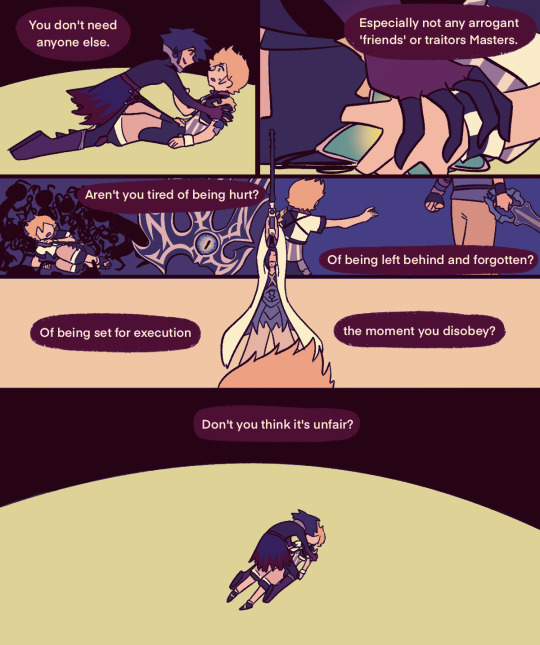
Vanitas stop projecting it's not making your case any more convincing
#GOD the dialogue here was a BITCH to write#it kept getting waaay too long and i had to keep editing and readjusting it#i ended up rewriting it THREE TIMES#vanitas STOP MONOLOUGING SO MUCH#vanitas#ventus#vanven#kinda. not like inherently but like. yk#kingdom hearts#kingdom hearts birth by sleep#kh#kh bbs#art#my art#xanders art#digital art#fan art
421 notes
·
View notes
Text

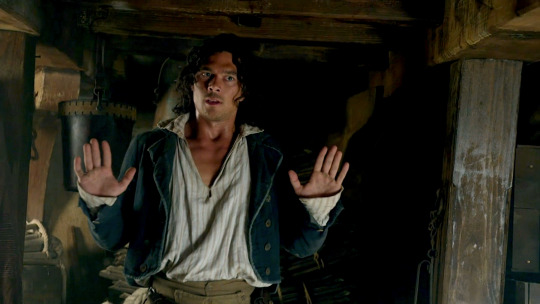



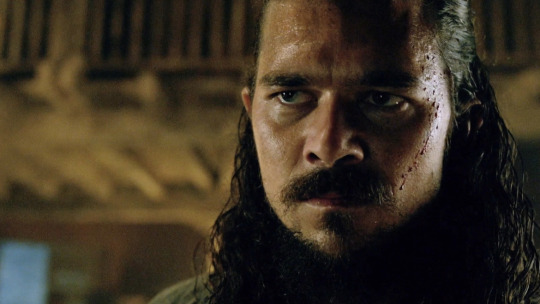

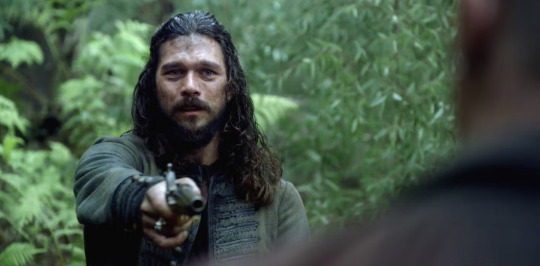

“I suppose at one time in my life I might have had any number of stories, but now there is no other. This is the only story I will ever be able to tell.” — The Secret History, Donna Tartt
#black sails#long john silver#john silver#black sails edit#do you get it so you see it. he comes into the story and he’s not long john silver yet. he doesn’t have to be. but the story goes on and#and he gets swept up in it more and more until he has to be long john silver. there’s only one ending. there’s only one story left for him#to obsess over for the rest of his life. he is shaped so wholly by the events that it’s all that’s left.#like luke arnold said: ‘he always had one leg out the door and then they cut it off f’
921 notes
·
View notes
Text
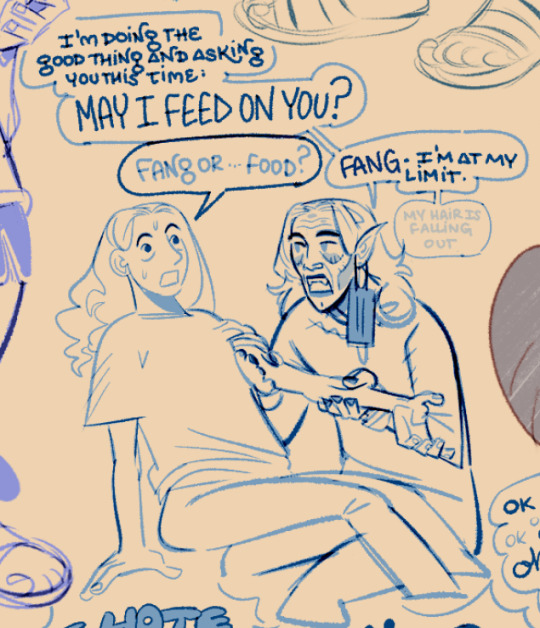
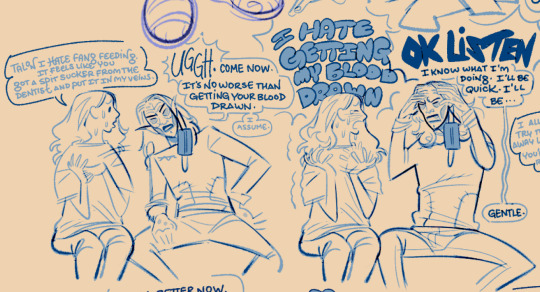

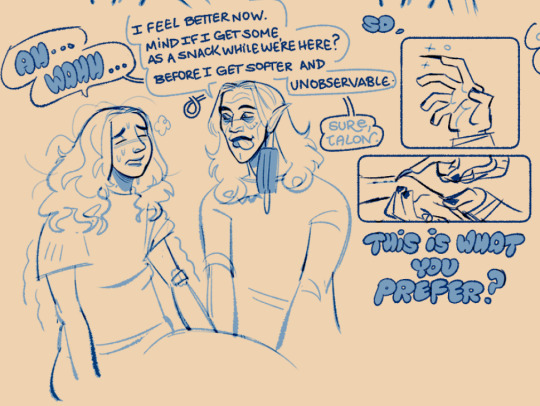
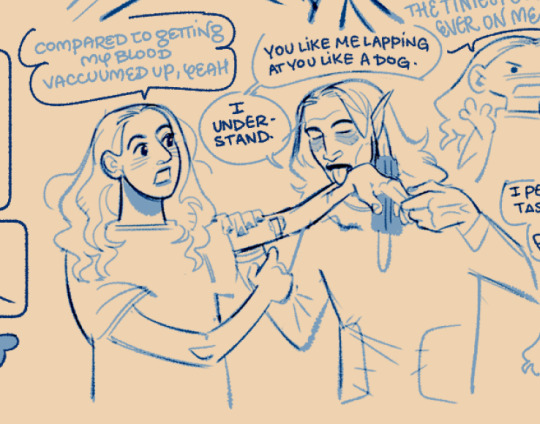
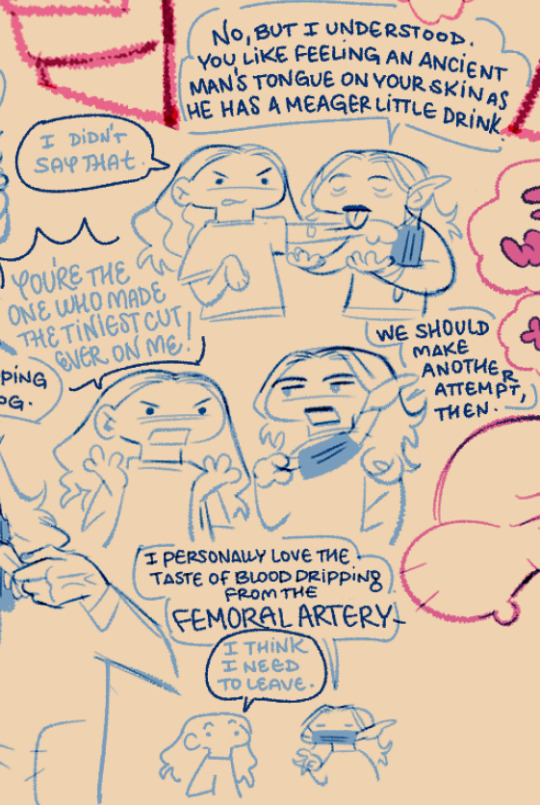
something silly and badly formatted
#a doodley#long post#sorry... i usually just draw freely on canvas then try to fit the drawings into wherever they fit once im done#but i like working with the space i have available and squeezing everything in...doesnt make for the best reading format tho#there's like 5 different art styles here and they all suck. my copium is i wanted to do this quickly#instead of spending so long on each drawing#but whenever i do this i just end up feeling bad about how Bad my little quick doodles are LOL#whatever !#i wanna say i promise i can draw better than this but that might not be true#im embarrassed by how long this post is 😭 i might edit it to all be under a read more. im Shy.#comic
805 notes
·
View notes
Text




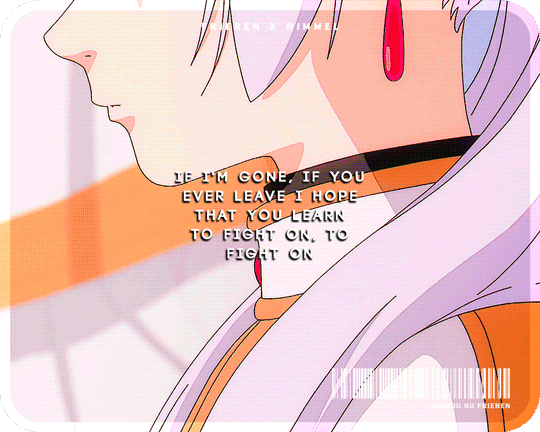

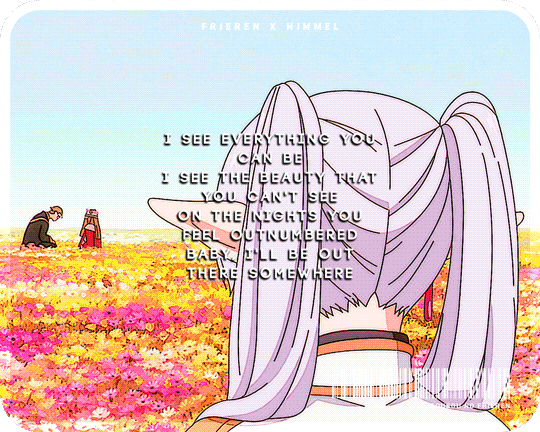
●◉✿ SOUSOU NO FRIEREN ❀ FRIEREN & HIMMEL ✿◉●
Anime: Sousou no Frieren
Characters: Frieren & Himmel
Song Lyrics: Outnumbered by Dermot Kennedy
↳ requested by Alice (@alice-chan-chan)
#sousou no frieren#frieren beyond journey's end#frieren at the funeral#frierenedit#anime#anime gif#animeedit#fyanimegifs#himawaari#tuserashes#userokkottsus#tuserelena#usertorichi#userdabiluna#useradrienne#usermica#usersophies#artsgifs#anisonggifs#ongoinganimeeditrequest#long post#HI ALICE! hope you like this!! <3#sorry it took a while ^^#every time i would look for frimmel scenes i ended up rewatching the episodes lol#anyways i enjoyed doing this edit! i wanted to incorporate song lyrics so it took more time#in fact i enjoyed it too much that i might make more frimmel sets hehehe#i even ended up making frimmel playlist on my spotify XD#i might use those songs as well on other frimmel sets <3
254 notes
·
View notes
Text
Double Indemnity, Veritas Ratio and Aventurine

This was originally a part of my compilation post as a short analysis on the Double Indemnity references, linking to this great thread by Manya on Twitter. However, I've recently watched the movie and found that the parallels run much deeper than just the mission name and the light cone itself, plus as the short synopsis I've read online. Since there isn't really an in-depth attempt at an analysis on the film in relation to the way Aventurine and Ratio present themselves throughout Penacony, I thought I'd take a stab at doing just that. I will also be bringing up things from Manya's thread as well as another thread that has some extra points.
Disclaimer that I... don't do analyses very often. Or write, in general — I'm someone who likes to illustrate their thoughts (in the artistic sense) more than write. There's just something about these two that makes me want to rip into them so badly, so here we are. If there's anything you'd like to add or correct me on, feel free to let me know in the replies or reblogs, or asks. This ended up being a rather extensive deep dive into the movie and its influences on the pairing, so please keep that in mind when pressing Read More.
There are two distinct layers on display in Ratio and Aventurine's relationship throughout Penacony, which are references to the two most important relationships in the movie — where they act like they hate/don’t know each other, and where they trust each other.
SPOILER WARNING for the entire movie, by the way. You can watch the film for free here on archive.org, as well as follow along with the screenplay here. I will also be taking dialogue and such from the screenplay, and cite quotes from the original novel in its own dedicated section. SPOILER WARNING for the Cat Among Pigeons Trailblaze mission, as well.

CONTENT WARNING FOR MENTIONS OF SUICIDE. YOU HAVE BEEN WARNED.
To start, Double Indemnity (1944) is a film noir by Billy Wilder (and co-written by Raymond Chandler) based on the novel of the same name by James M. Cain (1927). There are stark differences between the movie adaptation and the original novel which I will get into later on in this post, albeit in a smaller section, as this analysis is mainly focused on the movie adaptation. I will talk about the basics (summaries for the movie and the game, specifically the Penacony mission in tandem with Ratio and Aventurine) before diving into the character and scene parallels, among other things.

—
[THE NAME]
The term "double indemnity" is a clause in which if there’s a case of accidental death of a statistically rare variety, the insurance company has to pay out multiple of the original amount. This excludes deaths by murder, suicide, gross negligence, and natural causes.

The part of the mission in Cat Among Pigeons where Ratio and Aventurine meet with Sunday is named after the movie. And before we get further into things, let's get this part out of the way: The Chinese name used in the mission is the CN title of the movie, so there's no liberties taken with the localization — this makes it clear that it’s a nod to the movie and not localization doing its own thing like with the mission name for Heaven Is A Place On Earth (EN) / This Side of Paradise (人间天堂) (CN).

—
[SUMMARY OF THE 1944 MOVIE]
Here I summarised the important parts that will eventually be relevant in the analysis related to the game.

Insurance salesman Walter Neff, wounded from a gunshot, enters his office and confesses his crime on a dictaphone to his boss Barton Keyes, the claims manager. Much earlier, he had met Phyllis Dietrichson, the wife of Mr. Dietrichson and former nurse. Neff had initially wanted to meet Mr. Dietrichson because of car insurance. Phyllis claims her husband is mean to her and that his life insurance goes to his daughter Lola. With Neff seduced by Phyllis, they eventually brew up a scheme to murder Mr. Dietrichson in such a way that they activate the "double indemnity" clause, and the plan goes off almost perfectly. Initially, the death is labeled a suicide by the president of the company, Norton.
Keyes finds the whole situation suspicious, and starts to suspect Phyllis may have had an accomplice. The label on the death goes from accidental, to suicide, to then murder. When it’s ruled that the husband had no idea of the accidental policy, the company refuses to pay. Neff befriends Phyllis’ stepdaughter Lola, and after finding out Phyllis may have played a part in the death of her father’s previous wife, Neff begins to fear for Lola and himself, as the life insurance would go all towards her, not Phyllis.
After the plan begins to unravel as a witness is found, it comes out that Lola’s boyfriend Nino Zachette has been visiting Phyllis every night after the murder. Neff goes to confront Phyllis, intending to kill her. Phyllis has her own plans, and ends up shooting him, but is unable to fire any more shots once she realises she did love him. Neff kills her in two shots. Soon after telling Zachette not to go inside the house, Neff drives to his office to record the confession. When Keyes arrives, Neff tells him he will go to Mexico, but he collapses before he could get out of the building.
—
[THE PENACONY MISSION TIMELINE]

I won’t be summarising the entirety of Aventurine and Ratio’s endeavours from the beginning of their relationship to their final conversation in Heaven Is A Place On Earth the same way as I summarised the plot of the movie, so I will instead present a timeline. Bolded parts means they are important and have clear parallels, and texts that are in [brackets] and italics stand for the names of either the light cone, or the mission names.
[Final Victor] Their first meeting. Ratio’s ideals are turned on its head as he finally meets his match.
Several missions happen in-between their first encounter and the Penacony project. They come to grow so close and trusting with each other that they can guess, understand each other’s thoughts, way of thinking and minds even in high stakes missions. Enough to pull off the Prisoner’s Dilemma (Aventurine’s E1) and Stag Hunt Game (Aventurine’s E6) and come out on top.
Aventurine turns towards Ratio for assisting him in the Penacony project. Ratio's involvement in the project is implied to be done without the knowledge of Jade, Topaz, and the IPC in general, as he was only sent to Penacony to represent the Intelligentsia Guild, and the two other Stonehearts never mention Ratio.
Aventurine and Ratio cook up the plan to deceive Sunday before ever setting foot on Penacony. Aventurine does not tell Ratio the entirety of his plan.
Aventurine convinces Topaz and Jade to trust him with their Cornerstones. Aventurine also breaks his own Cornerstone and hides it along with the jade within a bag of gift money.
[The Youth Who Chase Dreams] They enter Penacony in the Reverie Hotel. Aventurine is taken to the side by Sunday and has all his valuables taken, which includes the gift money that contains the broken aventurine stone, the jade, and the case containing the topaz.
Aventurine and Ratio speak in a “private” room about how Aventurine messed up the plan. After faking an argument to the all-seeing eyes of Sunday, Ratio leaves in a huff.
Ratio, wearing his alabaster head, is seen around Golden Hour in the (Dusk) Auction House by March 7th.
[Double Indemnity] Ratio meets up with Sunday and “exposes” Aventurine to him. Sunday buys his “betrayal”, and is now in possession of the topaz and jade. Note that this is in truth Ratio betraying Sunday all along.
Ratio meets up with Aventurine again at the bar. Ratio tells Aventurine Sunday wants to see him again.
They go to Dewlight Pavilion and solve a bunch of puzzles to prove their worth to Sunday.
They meet up with Sunday. Sunday forces Aventurine to tell the truth using his Harmony powers. Ratio cannot watch on. It ends with Aventurine taking the gift money with his Cornerstone.
[Heaven Is A Place On Earth] They are in Golden Hour. Ratio tries to pry Aventurine about his plan, but Aventurine reins him in to stop breaking character. Ratio gives him the Mundanite’s Insight before leaving. This is their final conversation before Aventurine’s grandest death.
Now how exactly does the word “double indemnity” relate to their mission in-game? What is their payout? For the IPC, this would be Penacony itself — Aventurine, as the IPC ambassador, handing in the Jade Cornerstone as well as orchestrating a huge show for everybody to witness his death, means the IPC have a reason to reclaim the former prison frontier. As for Ratio, his payout would be information on Penacony’s Stellaron, although whether or not this was actually something he sought out is debatable. And Aventurine? It’s highly implied that he seeks an audience with Diamond, and breaking the Aventurine Cornerstone is a one way trip to getting into hot water with Diamond. With Aventurine’s self-destructive behaviour, however, it would also make sense to say that death would be his potential payout, had he taken that path in the realm of IX.
Compared to the movie, the timeline happens in reverse and opposite in some aspects. I will get into it later. As for the intended parallels, these are pretty clear and cut:
Veritas Ratio - Walter Neff
Aventurine - Phyllis Dietrichson
Sunday - Mr. Dietrichson

There is one other character who I feel also is represented in Ratio, but I won’t bring them up until later down the line.
For the sake of this analysis, I won’t be exploring Sunday’s parallel to Mr. Dietrichson, as there isn’t much on Dietrichson’s character in the first place in both the movie and the novel. He just kind of exists to be a bastard that is killed off at the halfway point. Plus, the analysis is specifically hyper focused on the other two.
—
[SO, WHAT’S THE PLAN?]
To make things less confusing in the long run whenever I mention the words “scheme” and “plan”, I will be going through the details of Phyllis and Neff’s scheme, and Aventurine and Ratio’s plan respectively. Anything that happens after either pair separate from another isn’t going to be included. Written in a way for the plans to have gone perfectly with no outside problems.

Phyllis and Neff —> Mr. Dietrichson
Goal: Activate the double indemnity clause by killing Mr. Dietrichson and making it look like a freak train accident
Payout: Twice or more of the face value of the life insurance ($100,000)
Main Actor: Walter Neff | Accomplice: Phyllis Dietrichson
During the entire time until the payout, Phyllis and Neff have to make sure to any outsiders that they look like complete strangers instead of lovers in an affair.
Step-by-step:
Neff convinces Mr. Dietrichson to sign the policy with the clause without him suspecting foul play, preferably with a third party to act as an alibi. This is done discreetly, making Mr. Dietrichson not read the policy closely and being told to just sign.
Neff and Phyllis talk to each other about small details through the phone (specified to be never at Phyllis’ own house and never when Neff was in his office) and in the marketplace only, to make their meetings look accidental. They shouldn’t be seen nor tracked together, after all.
Phyllis asks Mr. Dietrichson to take the train. She will be the one driving him to the train station.
On the night of the murder, after making sure his alibi is airtight, Neff sneaks into their residence and hides in their car in the second row seating, behind the front row passenger seat. He wears the same colour of clothes as Mr. Dietrichson.
Phyllis and Mr. Dietrichson get inside the car — Phyllis in the driver’s seat and Mr. Dietrichson in the passenger seat. Phyllis drives. On the way to the train station, she makes a detour into an alley. She honks the horn three times.
After the third honk, Neff breaks Mr. Dietrichson’s neck. The body is then hidden in the second row seating under a rug.
They drive to the train station. Phyllis helps Neff, now posing as Mr. Dietrichson, onto the train. The train leaves the station.
Neff makes it to the observation platform of the parlour car and drops onto the train tracks when nobody else is there.
Phyllis is at the dump beside the tracks. She makes the car blink twice as a signal.
The two drag Mr. Dietrichson’s corpse onto the tracks.
They leave.
When Phyllis eventually gets questioned by the insurance company, she pretends she has no idea what they are talking about and eventually storms off.
Phyllis and Neff continue to lay low until the insurance company pays out.
Profit!
Actual Result: The actual murder plan goes almost smoothly, with a bonus of Mr. Dietrichson having broken a leg. But with him not filing a claim for the broken leg, a witness at the observation platform, and Zachette visiting Phyllis every night after the murder, Keyes works out the murder scheme on his own, but pins the blame on Phyllis and Zachette, not Neff.

Now for Aventurine and Ratio. You can skip this section if you understand how deep their act goes, but to those who need a refresher, here’s a thorough explanation:
Aventurine and Ratio —> Sunday
Goal: Collect the aventurine stone without Sunday knowing, ruin the dream (and create the grandest death)
Payout: Penacony for the IPC, information on the Stellaron for Ratio, a meeting with Diamond / death for Aventurine
Main Actor: Aventurine | Accomplice: Veritas Ratio
From the moment they step onto Penacony, they are under Sunday’s ever present and watchful eyes. “Privacy” is a foreign word to The Family. They have to act like they don’t like each other’s company the entire time and feed Sunday information through indirect means so that the eventual “betrayal” by Ratio seems truthful to Sunday. Despite what it looks like, they are closer than one would ever think, and Ratio would never sell out a person purely for information.
Step-by-step:
After Sunday takes away the bag of gift money and box, Aventurine and Ratio talk in a room in the Reverie Hotel.
Aventurine establishes the Cornerstones’ importance, and how he lost the gift money and the case containing the Cornerstones to Sunday. Ratio turns to leave, saying “some idiot ruined everything”, meaning the Cornerstones were vital to their plan. (Note that Ratio is not wearing his alabaster head while saying it to said “idiot”.)
Aventurine then proceeds to downplay the importance of the Cornerstones, stating they are “nothing more than a few rocks” and “who cares if they are gone”. This lets Sunday know that something suspicious may be going on for him to act like it’s nothing, and the mention of multiple stones, and leaves him to look up what a Cornerstone is to the Ten Stonehearts of the IPC.
Ratio points out his absurd choice of outfit, mentioning the Attini Peacock and their song.
Ratio implies that without the aventurine stone, he is useless to the IPC. He also establishes that Aventurine is from Sigonia(-IV), and points out the mark on his neck. To Sunday, this means that Aventurine is shackled to the IPC, and how Aventurine may possibly go through extreme lengths to get the stone back, because a death sentence always looms above him.
Aventurine claims Ratio had done his homework on his background, which can be taken that this is their very first time working together. (It isn’t, and it only takes one look to know that Aventurine is an Avgin because of his unique eyes, so this comment does not make sense even in a “sincere” way, a running theme for the interaction.)
Ratio mentions how the true goal is to reclaim Penacony for the IPC, establishing their ulterior motive for attending the banquet.
Ratio asks if Aventurine went to pre-school in Sigonia after saying trust was reliant on cooperation. Aventurine mentions how he didn’t go to school and how he doesn’t have any parents. He even brings up how friends are weapons of the Avgins. This tells Sunday that the Avgins supposedly are good at manipulation and potentially sees Ratio possibly betraying Aventurine due to his carelessness with his “friends”. Sunday would also then research about the Avgins in general (and research about Sigonia-IV comes straight from the Intelligentsia Guild.)
Ratio goes to Dewlight Pavilion in Sunday’s Mansion and exposes a part of Aventurine’s “plan”. When being handed the suitcase, Ratio opens it up due to his apparent high status in the IPC. He tells Sunday that the Cornerstone in the suitcase is a topaz, not an aventurine, and that the real aventurine stone is in the bag of gift money. This is a double betrayal — on Aventurine (who knows) and Sunday (who doesn’t). Note that while Ratio is not officially an IPC member in name — the Intelligentsia Guild (which is run by the IPC head of the Technology Department Yabuli) frequently collaborates with the IPC. Either Aventurine had given him access to the box, or Ratio’s status in general is ambiguous enough for Sunday not to question him further. He then explains parts of Aventurine’s gamble to Sunday in order to sell the betrayal. Note that Ratio does not ever mention Aventurine’s race to Sunday.
Ratio brings Aventurine to Sunday. Aventurine offers help in the investigation of Robin's death, requesting the gift money and the box in return.
Sunday objects to the trade offer. Aventurine then asks for just the bag. A classic car insurance sales tactic. Sunday then interrogates Aventurine, and uses everything Ratio and Aventurine brought up in the Reverie Hotel conversation and their interactions in the Mansion, as well as aspects that Ratio had brought up to Sunday himself.
Aventurine feigns defeat and ignorance enough so that Sunday willingly lets him go with the gift bag. After all is said and done, Aventurine leaves with the gift money, where the Aventurine Cornerstone is stored all along.
Ratio and Aventurine continue to pretend they dislike each other until they go their separate ways for their respective goals and plans. Aventurine would go on to orchestrate his own demise at the hands of Acheron, and Ratio… lurks in the shadows like the owl he is.
Profit!
Actual Result: The plan goes perfectly, even with minor hiccups like Ratio coming close to breaking character several times and Aventurine being sentenced to execution by Sunday.
This is how Sunday uses the information he gathered against Aventurine:
• Sunday going on a tirade about the way Aventurine dresses and how he’s not one to take risks — Ratio’s comment about Aventurine’s outfit being peacock-esque and how he’s “short of a feather or two”.
• “Do you own a Cornerstone?” — Ratio talked about the aventurine stone.
• “Did you hand over the Cornerstone to The Family when you entered Penacony?” — Aventurine mentioned the box containing the Cornerstones.
• “Does the Cornerstone you handed over to The Family belong to you?” — Aventurine specifically pluralized the word Cornerstone and “a bunch of rocks” when talking to Ratio.
• “Is your Cornerstone in this room right now?” — The box in the room supposedly contained Aventurine’s own cornerstone, when Aventurine mentioned multiple stones.
• “Are you an Avgin from Sigonia?” —Aventurine mentioned that he’s an Avgin, and Ratio brought up Sigonia.
• “Do the Avgins have any ability to read, control, and manipulate one’s own or another’s minds?” — Aventurine’s comment on how friends are weapons, as well as Sunday’s own research on the Avgins, leading him to find out about the negative stereotypes associated with them.
• “Do you love your family more than yourself?” — His lost parents.
“All the Avgins were killed in a massacre. Am I right?” — Based on Sunday’s research into his background.
• “Are you your clan’s sole survivor?” — Same as the last point.
“Do you hate and wish to destroy this world with your own hands?” — Ratio mentioned the IPC’s goal to regain Penacony, and Aventurine’s whole shtick is “all or nothing”.
• “Can you swear that at this very moment, the aventurine stone is safe and sound in this box?” — Repeat.
As seen here, both duos have convoluted plans that involve the deception of one or more parties while also pretending that the relationship between each other isn’t as close as in reality. Unless you knew both of them personally and their histories, there was no way you could tell that they have something else going on.
On to the next point: Comparing Aventurine and Ratio with Phyllis and Neff.
—
[NEFF & PHYLLIS — RATIO & AVENTURINE]

With the short summaries of the movie and the mission out of the way, let’s look at Phyllis and Neff as characters and how Aventurine and Ratio are similar or opposite to them.

Starting off with Aventurine and Phyllis. Here is where they are the most similar:
Phyllis is blonde and described as a provocative woman. Aventurine is also a blond and eyes Ratio provocatively in the Final Victor light cone.
Phyllis was put under surveillance after Keyes starts figuring out that the so-called accidental death/suicide may have been a murder after all. Similarly, Aventurine was watched by Sunday the entire time in Penacony.
Phyllis never tells Neff how she's seeing another man on the side to possibly kill him too (as well as how she was responsible for the death of her husband‘s previous wife). Aventurine also didn't tell Ratio the entirety of his plan of his own death.
Phyllis puts on a somewhat helpless act at first but is incredibly capable of making things go her way, having everything seemingly wrapped around her finger. Aventurine — even when putting on a facade that masks his true motives — always comes out at the top.
Now the differences between Aventurine and Phyllis:
Phyllis does not care about her family and has no issue with killing her husband, his previous wife, and possibly her daughter Lola. Opposite of that, Aventurine is a family man… with no family left, as well as feeling an insane level of survivor’s guilt.
Really, Phyllis just… does not care at all about anyone but herself and the money. Aventurine, while he uses every trick in the book to get out on top, does care about the way Jade and Topaz had entrusted him with their Cornerstones, in spite of the stones being worth their lives.
Phyllis also uses other people to her advantage to get what she wants, often behind other people's backs, with the way she treats Neff and Zachette. Aventurine does as well (what with him making deals with the Trailblazer while also making a deal with Black Swan that involves the Trailblazer). The difference here is Phyllis uses her allure deliberately to seduce men while Aventurine simply uses others as pawns while also allowing others to do the same to himself.
Phyllis makes no attempt at compromising the policy when questioned by Norton. Aventurine ends up compromising by only taking the gift money (which is exactly what he needs).
The wig that Barbara Stanwyck (the actress of Phyllis) wore was chosen to make her look as “sleazy” as possible, make her look insincere and a fraud, a manipulator. A sort of cheapness. Aventurine’s flashy peacock-esque outfit can be sort of seen as something similar, except the outfit isn’t cheap.

Moving on to Ratio’s similarities to Neff… There isn’t much to extrapolate here as Ratio is more of a side character in the grand scheme of Penacony, however this is what I’ve figured out.
Neff has dark hair. Ratio has dark purple hair.
Neff almost never refers to Phyllis by her name when speaking with her, only as “baby”. The few times he refers to her as Phyllis or Mrs. Dietrichson is during their first conversations and when he has to act like he doesn’t know her. Ratio never calls Aventurine by his name when he’s around him — only as “gambler”, sometimes “damned” or “dear” (EN-only) gambler. Only in the Aventurine's Keeping Up With Star Rail episode does Ratio repeatedly say his name, and yet he still calls him by monikers like “gambler” or, bafflingly, a “system of chaos devoid of logic”.
Both Neff and Ratio committed two betrayals: Neff on Mr. Dietrichson and Keyes, and Ratio on Sunday and Aventurine. With the former cases it was to reach the end of the trolley line, and with the latter it was on a man who had put his trust in him.
As for the differences…
Neff is described as someone who’s not smart by his peers. Ratio is someone who is repeatedly idolised and put on a pedestal by other people.
Neff is excellent at pretending to not know nor care for Phyllis whenever he speaks about her with Keyes or when he and she are in a place that could land them in hot water (the office, the mansion when there are witnesses). His acting is on the same level as Phyllis. With Ratio it’s… complicated. While he does pull off the hater act well, he straight up isn’t great at pretending not to care about Aventurine’s wellbeing.
Instead of getting his gunshot wound treated in the hospital like a normal person, Neff makes the absolutely brilliant decision of driving to his office and talking to a dictaphone for hours. Needless to say, this is something a medical doctor like Ratio would never do.

Now here's the thing. Though it's very easy to just look at Phyllis and Neff in the movie and go "okay, Aventurine is Phyllis and Ratio is Neff — end of story" and leave it at that, I find that they both take from the two leads in different ways. Let me explain. Beginning with Aventurine and Neff…
Neff is the one who hatches the plan and encourages Phyllis to go through and claim the double indemnity clause in the first place. He is also the key player of his own risky plan, having to fake being the husband to enter the train as well as fake the death. Aventurine puts himself at great risk just by being in Sunday’s presence, and hoping that Sunday wouldn’t figure out that the green stone he had uncovered wasn’t the aventurine stone.
Adding onto the last point, Neff had fantasised about pulling off the perfect murder for a long time — the catalyst was simply him meeting Phyllis. Aventurine presumably sought out Ratio alone for his plan against Sunday.
Neff makes a roulette wheel analogy and talks about a pile of blue and yellow poker chips (the latter in the script only). I don‘t even have to explain why this is relevant here. (Aventurine’s Ultimate features a roulette wheel and the motif is on his belt, thigh strap, and back, too. And of course, Aventurine is all about his chips.)
Neff has certain ways to hide when he’s nervous, which include hiding his hands in his pockets when they were shaking, putting on glasses so people couldn’t see his eyes. Aventurine hides his left hand behind his back when he’s nervous: Future Aventurine says that "they don't know the other hand is below the table, clutching [his] chips for dear life", and in multiple occasions such as the Final Victor LC, his character trailer, and even in his boss form in the overworld you can see that Aventurine hides his left hand behind his back. And he is also seen with his glasses on sometimes.
Neff says a bunch of stuff to make sure that Phyllis acts her part and does not act out of character (i.e. during their interactions at the market), like how Aventurine repeatedly tries to get Ratio back on track from his subpar acting.
Neff is always one step ahead of the game, and the only reason the plan blows up in his face is due to outside forces that he could not have foreseen (a witness, Keyes figuring out the plan, the broken leg). Aventurine meanwhile plays 5D chess and even with the odds against him, he uses everything he can to come out on the top (i. e. getting Acheron to kill him in the dream).
Even after coming home on the night of the murder, Neff still felt that everything could have gone wrong. Aventurine, with his blessed luck, occasionally wavers and fears everything could go wrong whenever he takes a gamble.
Neff was not put under surveillance by Keyes due to him being extensive with his alibi. After witnessing Robin’s death with eyewitnesses at the scene, the Family had accepted Aventurine’s alibi, though he would be under watch from the Bloodhounds according to Ratio.
Neff talks about the entire murder scheme to the dictaphone. Aventurine during Cat Among Pigeons also retells his plan, albeit in a more convoluted manner, what with his future self and all.

Continuing with Ratio and Phyllis, even with their personalities and motivations being quite different, they do have a few commonalities.
Phyllis was a nurse. Ratio is a medical doctor.
Her name is Greek of origin. Veritas Ratio, though his name is Latin, has Greco-Roman influences throughout his entire character.
The very first scene Phyllis appears in has her wearing a bath towel around her torso. Ratio loves to take baths to clear his mind.
Phyllis was instructed by Neff to be at the market every morning at eleven buying things. Ratio is seen in an auction house with his alabaster head on so no one could recognize him.
Phyllis mostly acts as an accomplice to the scheme, being the one to convince her husband to take the train instead. She is also generally seen only when Neff is involved. Ratio plays the same role as well, only really appearing in the story in relation to Aventurine as well as being the accomplice in Aventurine’s own death. Even him standing in the auction house randomly can be explained by the theory that he and Aventurine had attempted to destabilise Penacony’s economy through a pump and dump scheme.
With these pointers out of the way, let’s take a closer look at select scenes from the film and their relation to the mission and the pair.
—
[THE PHONE CALL — THE REVERIE HOTEL]

Before the murder, there is a scene with a phone call between Phyllis and Neff discussing the plan while Keyes is in the same room as Neff. Neff has to make sure that Keyes doesn’t think of anything of the phone call, so he acts like he’s calling a “Margie”, and says a bunch of stuff that sounds innocent out of context (“Can’t I call you back, ‘Margie’?” “What color did you pick out?” “Navy blue. I like that fine”), but are actually hinting at the real plan all along (the suit that Mr. Dietrichson wears.)
In a roundabout way, the conversation between Ratio and Aventurine in the Reverie Hotel can be seen as the opposite of that scene — with the two talking about their supposed plan out loud on Penacony ground, a place where the Family (and in turn, Sunday) has eyes everywhere. Despite being in a “private” room, they still act like they hate each other while airing out details that really do not make sense to air out if they really did meet the first time in Penacony (which they didn’t — they’ve been on several missions beforehand). It’s almost like they want a secret third person to know what they were doing, instead of trying to be hushed up about it. The TVs in the room that Sunday can look through based on Inherently Unjust Destiny — A Moment Among The Stars, the Bloodhound statue that disappears upon being inspected, the owl clock on the left which side eyes Ratio and Aventurine, all point to that Sunday is watching their every move, listening to every word.
Rewinding back to before the phone call, in one of the encounters at the marketplace where they “accidentally” run into each other, Phyllis talks about how the trip was off. How her husband wouldn’t get on the train, which was vital for their plan, because of a broken leg. All this, while pretending to be strangers by the passersby. You could say that the part where Ratio almost leaves because Aventurine had “ruined the plan” is the opposite of this, as the husband breaking his leg was something they couldn’t account for, while Aventurine “being short of a few feathers” was entirely part of the plan.
—
[QUESTIONING PHYLLIS — THE INTERROGATION]

This section is going to be a little longer as I will cover two scenes in the movie in a more detailed manner — Mr. Dietrichson signing the policy, and Phyllis being questioned — and how they are represented in the Sunday-Aventurine interrogation and the prior conversation between Ratio and Sunday in multitudes of ways.
Going about their plan, Neff has to make sure that Mr. Dietrichson signs the policy with the double indemnity clause without him knowing the details, all the while having Phyllis (and Lola) in the same room. He and Phyllis have to pretend that they don’t know each other, and that this is just the standard accidental insurance process, instead of signing what would be his downfall. To sell it, he gets Mr. Dietrichson to sign two “copies” of the form, except with Mr. Dietrichson’s second signature, he’s duped into signing the accident insurance policy with the respective clause.
You can tie this to how Ratio goes to Sunday in order to “expose” the lie that the suitcase didn’t actually contain the Aventurine Cornerstone, as well as there being more than one Cornerstone involved in the scheme. Ratio must make sure that Sunday truly believes that he dislikes Aventurine’s company, while also making sure that Sunday doesn’t figure out the actual aventurine stone is broken and hidden in the gift bag. The scheme turns out to be successful, as Sunday retrieves the two Cornerstones, but not the aventurine stone, and truly does think that the green stone he has in his possession is the aventurine.

This whole scene with Sunday is also reminiscent of the interrogation scene in the middle of the movie, where Phyllis was questioned by the boss (Norton) who was deducing that Mr. Dietrichson's death was a suicide, not accidental death. Neff, Phyllis, Keyes and Norton were all in the same room, and Neff and Phyllis had to act like they never knew the other. Phyllis acts like she knows nothing about what Norton insinuates about her husband and eventually, Phyllis explodes in anger and storms out the room, even slamming the door. Her act is very believable to any outsider.

Now back to the Ratio and Sunday conversation. One glaring difference between the movie and here is that his acting isn’t great compared to either Phyllis nor Neff. It never was throughout the Penacony mission. He even comes very close to breaking character several times, and is even defending Aventurine in a somewhat aggressive manner during his one-on-one conversation with Sunday, as in he literally tells Sunday to see a shrink. It’s very different from the way he was acting in Herta Space Station — like Ratio cares about Aventurine too much to keep his hands off.
It's also worth pointing out that Neff doesn't speak a word when Phyllis was being interrogated. Similarly, Ratio is silent throughout the entire scene with Sunday and Aventurine, with his only “line” being a “hm”. When Aventurine calls him a wretch to his face, all he does is look to the side. In fact, he can only look at Aventurine when the other isn’t staring back. Almost like him uttering a single word would give them away. Or his acting is terrible when it has to do with Aventurine, as he has no issue doing the same thing in Crown of the Mundane and Divine (Mundane Troubles).
So, Sunday finds out about the Cornerstones and reveals them to Aventurine, and reasons that he cannot give them back to him because Aventurine had lied. Note that in that same scene, Aventurine attempted to use the two murders that had occurred beforehand against Sunday to retrieve his own cornerstone. Similarly, when it was revealed that Mr. Dietrichson did not know about the accident policy and that the so-called “accidental death” was not, in fact, accidental, the insurance company refused to pay out the money.
Unlike the movie, this was all planned, however. The double-crossing by Ratio, the gift money being the only thing required for Aventurine’s real plan. All of it was an act of betrayal against Sunday, in the same manner as the meticulous planning as Mr. Dietrichson’s murder — To sign the policy, get him to take the train, kill him on the way, and to have Neff pose as the husband on the train until the time is right to get off and lay the body on the tracks. A key difference is that they could not have expected their scheme to be busted wide open due to forces outside of their control, while Ratio and Aventurine went straight down the line for the both of them no matter what.
From here on out, we can conclude that the way Ratio and Aventurine present themselves in Penacony to onlookers is in line with Neff and Phyllis.
—
[“GOODBYE, BABY” — FINAL VICTOR]

And now for the (in)famous light cone, Final Victor. The thing that truly kickstarted the Ratio and Aventurine ship in the fanbase, and the partnership between the two in general. It’s a direct reference to the final confrontation between Neff and Phyllis in the movie.
I’ll fire through all the similarities between the two scenes.
During the respective scenes, Aventurine and Phyllis both outsmart their partner one way or the other: Aventurine with his one-sided game of Russian Roulette, and Phyllis hiding her gun underneath the cushions until Neff turned away.
The guns are owned by Phyllis and Aventurine, not Neff and Ratio.
Phyllis couldn’t bring herself to fire any more shots after she realised she truly did love Neff. Ratio could do nothing but watch as Aventurine did what he did — he couldn’t even pull away if the LC animation is anything to go by him struggling as Aventurine firmly keeps the gun to his chest.
Neff says he doesn’t buy (believe) that Phyllis loved him. She then goes “I’m not asking you to buy […]”. The LC description has Aventurine ask Ratio “You don’t believe me?”, while in the LC animation Ratio straight up says “You expect me to believe you?” and Aventurine answering “Why not, doctor/professor?”
The visual composition of the LC and the scene are nearly identical, from the lighting to the posing to the way Aventurine looks at Ratio — Aventurine and Ratio are even wearing different outfits to fit the scene better. The background in the LC is also like the blinders in the movie, just horizontal.
In the shot where Phyllis’ face is more visible, the way she looks at Neff is strikingly like the way provocatively looks at Ratio. Even their eyes have a visible shine — Phyllis’ eyes brightly shining the moment she realised she really fell in love with Neff, and Aventurine having just a little light return to his eyes in that specific moment.
And now the differences!
Neff holds the gun in his right hand. Aventurine makes Ratio hold his gun in his left.
Neff is the one who takes the gun from Phyllis‘ hand. Aventurine is the one who places the gun in Ratio’s hand and fires it.
Three gunshots are fired. In the movie, Phyllis shoots the first shot and Neff the second and third. Aventurine unloads the gun and leaves only one bullet for this game of Russian Roulette. He pulls the trigger three times, but they all turn out to be blanks.
Phyllis does not break her façade of not smiling until the very last moment where she gets shot. Aventurine is smiling the entire time according to the light cone description, whilst in the animation, it’s only when he guides the gun to his chest that he puts it on.
So, you know how Neff meets Phyllis and it all goes off the rails from there. The way Neff goes from a decent guy to willingly involve himself in a murder scheme, having his morals corrupted by Phyllis. His world having been turned upside down the moment he lays eyes on Phyllis in that first meeting. Doesn’t that sound like something that happened with the Final Victor LC? Ratio, a man all about logic and rationality — a scholar with eight PhDs to his name — all of that is flipped on its head the moment Aventurine pulls out his gun in their first meeting and forces Ratio to play a game of Russian roulette with him. Aventurine casually gambles using his own life like it’s nothing and seemingly without fear (barring his hidden left hand). All or nothing — and yet Aventurine comes out alive after three blanks. Poetic, considering there’s a consumable in the game called “All or Nothing” which features a broken chess piece and a poker chip bound together by a tie. The poker chip obviously represents the gambler, but the chess piece specifically stands for Ratio because he plays chess in his character trailer, his Keeping Up With Star Rail episode and his introduction is centred around him playing chess with himself. Plus, the design of the chess piece has golden accents, similar to his own chess set. In the end, Aventurine will always be the final victor.
Furthermore, Neff had deduced that Phyllis wanted to kill her husband and initially wanted no part in it, but in a subsequent visit it was his own idea that they trigger the double indemnity clause for more money. As the movie progresses though, he starts to have his doubts (thanks in part to him befriending Lola) and makes the move to kill Phyllis when everything starts to come to light. It’s strikingly similar to how Ratio initially wanted no part in whatever Aventurine had in mind when they first met, but in the subsequent missions where they were paired up, he willingly goes along with Aventurine's risky plans, and they come to trust each other. Enough so that Aventurine and Ratio can go to Penacony all on their own and put on an act, knowing that nobody in the IPC other than them can enter the Dreamscape. The mutual respect grew over time, instead of burning passionately before quickly fizzling out like in the movie.
Basically, in one scene, three shots (blanks) start a relationship, and in the other, it ends a relationship. In the anan magazine interview with Aventurine, he says himself that “form[ing] an alliance with just one bullet” with Ratio was one of his personal achievements. The moment itself was so impactful for both parties that it was immortalised and turned into a light cone.
—
[THE ENDING — GOLDEN HOUR]

The ending of Double Indemnity that made it into the final cut has Neff continue his confession on the dictaphone until he realised that he wasn’t alone in the room. Keyes had come inside at some point, but none had said a thing, only listening to a dead man speak of his crime. When Neff sees Keyes, they talk for a moment, Neff says he plans on fleeing to Mexico. Keyes does not think he will make it. He tries to leave, only to collapse at the front of the elevator, Keyes following just behind him. Neff attempts to light a cigar but is too weak to do so, so Keyes does it for him.
Parts of the ending can still be attributed to the interrogation scene between Sunday and Aventurine, so I’ll make this quick before moving on to the conversation in Heaven Is A Place On Earth, Ratio and Aventurine’s final conversation together. Once Sunday mentions how quickly Aventurine gave up the suitcase, he inflicts the Harmony’s consecration on him, which forces Aventurine to confess everything that Sunday asks of. In a way, it’s the opposite of what happens in the movie — where Neff willingly tells the truth about the murder to his coworker. Aventurine does not like Sunday, and Neff is close to Keyes. Ratio also does not speak, similarly to how Keyes didn’t speak and stood silently off to the side.
Post-interrogation in Golden Hour, Ratio worriedly prods at Aventurine and asks him about his plan. He then gives him the Mundanite’s Insight with the Doctor’s Advice inside when Aventurine tells him to leave. Throughout Heaven Is A Place On Earth, Aventurine gets weaker and his head starts to buzz, until he falls to the ground before he can hand in the final gems. Similarly, Neff progressively grows weaker as he records his confession. Keyes says he’s going to call a doctor and Neff says he’s planning to go to Mexico. And when Neff collapses near the elevator, they talk one final time and Keyes lights Neff’s cigar as the other was too weak to do so himself.

—
[OPPOSITE TIMELINES AND DEVELOPMENTS]
Remember how I said the way certain events happen in the movie and the game are mostly opposite and reverse of one another?
The Final Victor LC is the first meeting of Ratio and Aventurine, and Neff killing Phyllis is their final meeting.
Between that first and last meeting between Phyllis and Neff’s whirlwind romance, their relationship becomes strained which ultimately leads to Neff not trusting whatever Phyllis has to say at the end point of the movie. As for Ratio and Aventurine, the exact opposite had happened, to the point where Ratio trusts Aventurine enough to go along with his plans even if they went against his own ideals. The basis of the mission involved Veritas Ratio, whose full name includes the Latin word for “truth”, lying the entire time on Penacony.
Aventurine is sentenced to the gallows by Sunday after his unwilling interrogation. The movie starts and ends with Neff willingly confessing everything to Keyes.
It bears repeating, but I have to make it so clear that the trust between Ratio and Aventurine runs incredibly deep. Being able to predict what your partner says and thinks and plans in a mission as critical as the Penacony project is not something first-time co-workers can pull off flawlessly. All the while having to put on masks that prevent you from speaking sincerely towards one another lest you rat yourselves out. You have no way of contacting outside reinforcements from within Penacony, as the rest of the IPC are barred from entering. To be able to play everybody for fools while said fools believe you yourselves have handed your case on a silver platter requires a lot — trust, knowledge of the other, past experience, and so on. With Phyllis and Neff, the trust they had had been snuffed out when Neff grew closer to Lola and found out what kind of person Phyllis truly was on the inside. Phyllis did not trust nor love Neff enough and was going behind his back to meet with Zachette to possibly take Neff and Lola out. And the whole reason Neff wanted to perpetrate the murder was due to him being initially taken by Phyllis' appearance, which single handedly got the ball rolling on the crime.
Now then, how come trust is one of the defining aspects of Aventurine and Ratio’s relationship, when Phyllis and Neff’s trust eventually lead to both their deaths at the hands of the other? Sure, this can be explained away with the opposite theory, but there’s one other relationship involving Neff which I haven’t brought up in excruciating detail yet. The other side of Ratio and Aventurine’s relationship.
—
[NEFF & KEYES — AVENTURINE & RATIO]

Here is where it gets more interesting — while Phyllis and Neff are at the centre point of the movie, there is another character to whom Neff has a close relationship with — Keyes. It’s also the only relationship with no pretences, at least, until the whole murder thing happened and Neff had to hide his involvement from Keyes. Watching the movie, I couldn't help but feel there was something more to the two than meets the eye. I knew that queer readings of the film existed, but I didn't think too much of them until now. And though Aventurine and Ratio parallel Phyllis and Neff respectively, the fact that they also have traits of their opposite means that it wouldn’t be completely out of the question if parts of their relationship were also influenced by Keyes and Neff on a deeper and personal level. Let me explain.
Keyes and Neff were intimate friends for eleven years and have shown mutual respect and trust towards one another. They understood each other on a level not seen with Phyllis and Neff. Even after hearing Neff confess his crimes through the dictaphone (and eventually standing in the same room while Neff confessed), he still cared for the other man, and stayed with him when Neff collapsed at the front door. The only reason Keyes hadn’t deduced that it was Neff who was behind the murder was because he had his absolute trust in him. Keyes is also Neff’s boss, and they are always seen exchanging playful banter when they are on screen together. Neff even says the words “I love you, too” twice in the movie — first at the beginning and second at the end, as the final line. There’s also the persistent theme of Neff lighting Keyes’ cigarettes (which happens in every scene where they are face-to-face), except in the end where it’s Keyes who lights Neff’s.
Doesn’t that sound familiar? Mutual respect, caring too much about the other person, the immense amount of trust… Ratio says he’s even the manager of the Penacony project (which may or may not be a lie), and despite their banter being laced with them acting as “enemies”, you can tell that in Dewlight Pavilion pre-Sunday confrontation that Aventurine genuinely likes Ratio’s company and believes him to be a reliable person. From the way he acts carefree in his words to the thoughts in his head, as seen in the mission descriptions for Double Indemnity. Their interactions in that specific mission are possibly the closest thing to their normal way of speaking that we get to see on Penacony.

Not to mention, this is the way Neff describes Keyes. He even says (not in the script) “you never fooled me with your song and dance, not for a second.” Apart from the line about the cigar ashes, doesn’t this ring a bell to a certain doctor? “Jerk” with a heart of gold?

After solving the puzzle with the statues, Ratio jokingly offers Aventurine to join the Genius Society. Aventurine then goes "Really? I thought you’ve given up on that already", and then Ratio says it was, in fact, a joke. Solving the puzzle through brute force has Ratio telling Aventurine that the Council of Mundanites (which Ratio himself is a part of) should consider him a member. In the movie, where the scene with the phone call with Neff and Phyllis reiterating details of their plan happens, Keyes actually offered Neff a better job (specifically a desk job, as Keyes’ assistant). The two pairs saw the other as smart, equals, and were invested in each other’s careers one way or another.

Because of all this, the character parallels for this side of the relationship are as follows:
Aventurine - Walter Neff
Veritas Ratio - Barton Keyes
With the way I’ve talked about how Aventurine and Ratio take from both leads in terms, it does fit to say that Aventurine is Neff, and Ratio is Keyes in this layer of their relationship. Since we’re on the topic of Keyes, let me also go through some similarities with him and Ratio specifically.
Keyes says the words “dimwitted amateurs” in his first on-screen conversation with Neff. You can’t have Dr. Ratio without him talking about idiocy in some way.
Keyes almost only appears in the movie in relation to Neff, and barring a single interaction in Neff’s house, is also only seen in the office. Same with Phyllis, Ratio also only ever appears regarding Aventurine.
Keyes genuinely wanted the best for Neff, even offering to celebrate with him when he thought the case truly had been busted wide open by forces when Zachette entered the picture. You could say the same for Ratio, as he hoped that Aventurine wouldn’t dwell on the past according to his response on Aventurine’s Interview, as well as telling him to “stay alive/live on (CN)” and wishing him the best of luck in his Doctor’s Advice note.
Whether or not you believe that there was more going on with Neff and Keyes is up to you, but what matters is that the two were very close. Just like Ratio and Aventurine.
—
[THE ORIGINAL FILM ENDING]
Something that I hadn’t seen brought up is the original ending of Double Indemnity, where Neff is executed in a gas chamber while Keyes watches on, shocked, and afterwards leaves somberly. The ending was taken out because they were worried about the Hays Code, but I felt it was important to bring it up, because in a way, you can kind of see the Sunday interrogation scene as Sunday sending Aventurine to his death in seventeen system hours. And Ratio doesn’t speak at all in that scene, and Keyes doesn’t either according to the script.
Another thing that’s noteworthy is that Wilder himself said “the story was about the two guys” in Conversations with Wilder. The two guys in question are Keyes and Neff.

—
[THE NOVEL]

With the original film ending covered, now it is time to bring up the novel by James M. Cain. I bought the book just to read about the differences between the adaptation and the original source material, and to list a few more similarities and opposites I could gather. For this section alone, due to the changes in the (last) names of certain characters, I will be referring to Walter Huff (Neff in the movie) as Walter, and Mr. Dietrichson as Nirdlinger. The plot is pretty much the same as the movie’s apart from a couple of changes so there isn’t a need to recount everything.
From my two read-throughs of the novel, these are the following passages that stood out to me the most. Starting with Aventurine:
Walter, as a top businessman of the company, knows how to sway a deal and to get what he truly wants with what the other gives him. Aventurine is the same, reliant on his intuition, experience and whatever information he has on the table to claim the win. Him luring out Sparkle in Heaven Is A Place On Earth and his conversation with Acheron in the Nihility is indicative of that.
• "But you sell as many people as I do, you don't go by what they say. You feel it, how the deal is going. And after a while I knew this woman didn't care anything about the Automobile Club. Maybe the husband did, but she didn't. There was something else, and this was nothing but a stall. I figured it would be some kind of a proposition to split the commission, maybe so she could get a ten-spot out of it without the husband knowing. There's plenty of that going on. And I was just wondering what I would say to her."
Phyllis, like in the movie, had been hiding her true intentions of talking to Walter in their first conversations, always saying things that she didn’t actually mean. In a similar vein, Aventurine consistently says stuff but almost never truly means any of it, which is all part of his façade.
• "And I could feel it again, that she wasn't saying what she meant. It was the same as it was the first afternoon I met her, that there was something else, besides what she was telling me. And I couldn't shake it off, that I had to call it on her."
When discussing the murder plan with Phyllis, Walter makes this comment, kind of like how Aventurine seems to operate in a way where he has a plan, but is ready to improvise and think fast when needed.
• "And then it's one of those things where you've got to watch for your chance, and you can't plan it in advance, and know where you're going to come out to the last decimal point."
Remember the roulette wheel line from the movie? In the novel, the gambling metaphor that Walter makes about the insurance business goes on for two paragraphs, mentioning a gambling wheel, stack of chips, a place with a big casino and the little ivory ball, even about a bet on the table. Walter also talks about how he thinks of tricks at night after being in the business for so long, and how he could game the system. Needless to say, insanely reminiscent of Aventurine.
• "You think I’m nuts? All right, maybe I am. But you spend fifteen years in the business I’m in, and maybe a little better than that, it’s the friend of the widow, the orphan, and the needy in time of trouble? It’s not. It’s the biggest gambling wheel in the world. It don’t look like it, but it is, from the way they figure the percentage on the oo to the look on their face when they cash your chips. You bet that your house will burn down, they bet it won’t, that’s all. What fools you is that you didn’t want your house to burn down when you made the bet, and so you forget it’s a bet. To them, a bet is a bet, and a hedge bet don’t look any different than any other bet. But there comes a time, maybe, when you do want your house to burn down, when the money is worth more than the house. And right there is where the trouble starts."
• "Alright, I’m an agent. I’m a croupier in that game. I know all their tricks, I lie awake thinking up tricks, so I’ll be ready for them when they come at me. And then one night I think up a trick, and get to thinking I could crook the wheel myself if I could only put a plant out there to put down my bet."
• "I had seen so many houses burned down, so many cars wrecked, so many corpses with blue holes in their temples, so many awful things that people had pulled to crook the wheel, that that stuff didn’t seem real to me anymore. If you don’t understand that, go to Monte Carlo or some other place where there’s a big casino, sit at a table, and watch the face of the man that spins the little ivory ball. After you’ve watched it a while, ask yourself how much he would care if you went out and plugged yourself in the head. His eyes might drop when he heard the shot, but it wouldn’t be from the worry whether you lived or died. It would be to make sure you didn’t leave a bet on the table, that he would have to cash for your estate. No, he wouldn’t care."
Returning home from the murder, Walter attempted to pray, but was unable to do it. Some time passed and after speaking to Phyllis, he prayed. Aventurine presumably hadn’t done the prayer ever since the day of the massacre, and the first time he does it again, he does it with his child self.
• "I went to the dining room and took a drink. I took another drink. I started mumbling to myself, trying to get so I could talk. I had to have something to mumble. I thought of the Lord's Prayer. I mumbled that, a couple of times. I tried to mumble it another time, and couldn't remember how it went."
• "That night I did something I hadn’t done in years. I prayed."
Phyllis in the book is much more inclined towards death than her movie version, even thinking of herself as a personification of death. She’s killed ten other people (including infants) prior to the events of the novel. Something to keep in mind as Aventurine had mentioned several times that he attempted to kill himself in the dream, plus his leadup to his “grandest death”. Just like Phyllis, he’s even killed at least a few people before, though the circumstances of that were less on his own volition and more so for the sake of his survival (i.e. the death game in the maze involving the 34 other slaves where he was the winner and another time where he murdered his own master). Instead of Phyllis playing the active role of Death towards everybody else, Aventurine himself dances with Death with every gamble, every time his luck comes into play. Danse Macabre.
• "But there’s something in me, I don’t know what. Maybe I’m crazy. But there’s something in me that loves Death. I think of myself as Death, sometimes."
• "Walter, The time has come. For me to meet my bridegroom [Death]. The only one I ever loved."
Moving on to Ratio:
Walter says several times that it’s hard to get along with Keyes, and how he says nice things after getting you all worked up. A hard-headed man to get along with, but damn good at his job. Sound like someone familiar?
• "That would be like Keyes, that even when he wanted to say something nice to you, he had to make you sore first."
• "It makes your head ache to be around him, but he’s the best claim man on the Coast, and he was the one I was afraid of."
Keyes sees Walter as smarter than half the fools in the company. Ratio can only stand the company of Aventurine in regards to the IPC.
• "Walter, I'm not beefing with you. I know you said he ought to be investigated. I've got your memo right here on my desk. That's what I wanted to tell you. If other departments of this company would show half the sense that you show—"
• "Oh, he confessed. He's taking a plea tomorrow morning, and that ends it. But my point is, that if you, just by looking at that man, could have your suspicions, why couldn't they—! Oh well, what's the use? I just wanted you to know it."
After going on a rant about the H.S. Nirdlinger case (Phyllis’ husband) and how Norton is doing a horrible job, he ends it by saying that it’s sheer stupidity. “Supreme idiocy”, anybody?
• "You can’t take many body blows like this and last. Holy smoke. Fifty thousand bucks, and all from dumbness. Just sheer, willful, stupidity!"
Phyllis’ former occupation as a nurse is more elaborated on, including her specialization — pulmonary diseases. One of Ratio’s crowning achievements is curing lithogenesis, the “King of Diseases”.
• "She’s one of the best nurses in the city of Los Angeles. […] She’s a nurse, and she specialized in pulmonary diseases. She would know the time of crisis, almost to a minute, as well as any doctor would."
As for the murder scheme, they talk about it a lot more explicitly in the novel. Specifically, Walter mentions how a single person cannot get away with it and that it requires more people to be involved. How everything is known to the party committing the crime, but not the victim. And most importantly: Audacity.
"Say, this is a beauty, if I do say it myself. I didn't spend all this time in the business for nothing, did I? Listen, he knows all about this policy, and yet he don't know a thing about it. He applies for it, in writing, and yet he don't apply for it. He pays me for it with his own check, and yet he don't pay me. He has an accident happen to him and yet he don't have an accident happen to him. He gets on the train, and yet he don't get on it."
"The first is, help. One person can't get away with it, that is unless they're going to admit it and plead the unwritten law or something. It takes more than one. The second is, the time, the place, the way, all known in advance—to us, but not him. The third is, audacity. That's the one that all amateur murderers forget. They know the first two, sometimes, but that third, only a professional knows. There comes a time in any murder when the only thing that can see you through is audacity, and I can't tell you why."
"And if we want to get away with it, we've got to do it the way they do it, […]"
"Be bold?"
"Be bold. It's the only way."
"I still don't know—what we're going to do."
"You'll know. You'll know in plenty of time."
"We were right up with it, the moment of audacity that has to be be part of any successful murder."
It fits the situation that Aventurine and Ratio find themselves in extremely well: For the first point— Aventurine would not be able to get away with simply airing out details by himself, as that would immediately cast suspicion on him. Having another person accompany him who not only isn’t really a part of the IPC in name (as the IPC and The Family have a strenuous relationship) but would probably be able to get closer to Sunday because of that means they can simply bounce off each other without risking as much suspicion with a one-man army. Which is exactly what Ratio and Aventurine do in the conversations they have on Penacony. Secondly — they knew how Sunday operates: as a control freak, he leaves no stone unturned, which is how he became Head of the Oak Family, so their acting required them to give off the impression that a. they hated each other, b. Ratio would go against Aventurine’s wishes and expose him in return for knowledge, c. there were only the two Cornerstones that were hidden. This would give Sunday the illusion of control, and lead to Sunday to lower his guard long enough for Aventurine to take the gift money in the end. The pair knew this in advance, but not Sunday. And thirdly — the plan hinged on a high-level of risk. From breaking the Aventurine Cornerstone, to hoping that Sunday wouldn’t find it in the gift bag, to not telling Ratio what the true plan is (meaning Ratio had to figure it out on his own later on), to Sunday even buying Ratio’s story, it was practically the only way they could go about it. “Charming audacity”, indeed.
An interesting aspect about the novel is that the ending of the novel is divergent from the movie’s final cut and the original ending: Phyllis and Walter commit suicide during a ferry ride to Mexico. The main reason this was changed for the movie was because of the Hays Code, and they wouldn’t allow a double suicide to be screened without reprecussions for criminals. There’s also a bunch of other aspects that differentiate the novel from the movie (no narration-confession as the confession happens in a hospital, less characterization for Keyes and instead a bigger focus on Lola and her boyfriend, the focus on the murderous aspect of Walter and Phyllis’ relationship instead of actual romance, Walter falling in love with Lola (with an unfortunately large age gap attached), etc.)
As for the ending, this wouldn’t even be the first romance media reference related to Aventurine and Ratio where both the leads die, with the other being The Happy Prince and San Junipero (in relation to the EN-only Heaven Is A Place On Earth reference), which I normally would chalk up as a coincidence, though with the opposite line-of-thought I have going on here (and the fact that it’s three out of four media references where the couple die at the end…), I think it’s reasonable to say that Ratio and Aventurine will get that happy ending. Subverting expectations, hopefully.
—
[THE HAYS CODE — LGBT CENSORSHIP IN CHINA]
I’ve brought up the Hays code twice now in the previous two sections, but I haven’t actually explained what exactly it entails.
The Hays Code (also known as the Motion Picture Production Code) is a set of rules and guidelines imposed on all American films from around 1934 to 1968, intended to make films less scandalous, morally acceptable and more “safe” for the general audiences. Some of the “Don’ts” and “Be Carefuls” include but are not limited to…
(Don’t) Pointed profanity
(Don’t) Inference of sex perversion (which includes homosexuality)
(Don’t) Nudity
(Be Careful) Sympathy for criminals
(Be Careful) Use of firearms
(Be Careful) Man and woman in bed together

What does this have to do with a Chinese gacha game released in 2023? If you know a little bit about miHoYo’s past, you would know that pre-censorship laws being upheld to a much stronger and stricter degree, they had no problem showcasing their gay couples in Guns Girl Z (Honkai Gakuen 2/GGZ) and Honkai Impact 3rd, with the main three being Bronya/Seele, Kiana/Mei (admittedly the latter one is a more recent example, from 2023), and Sakura/Kallen. Ever since the Bronya and Seele kiss, censorship in regards to LGBT content ramped up, causing the kiss to be removed on the CN side, and they had to lay low with the way they present two same-sex characters who are meant to be together. They can’t explicitly say that two female or male characters are romantically involved, but they can lace their dynamics with references for those “in the know” — Subtext. Just enough to imply something more but not too much that they get censored to hell and back.
So what I’m getting at is this: The trouble that Double Indemnity had to go through in order to be made while also keeping the dialogue of Phyllis and Neff as flirtatious as they could under the Hays Code among other things is quite similar to the way Ratio and Aventurine are presented as of now. We never see them interact outside of Penacony (at least up until 2.2, when this post was drafted), so we can only infer those interactions specifically until they actually talk without the fear of being found out by Sunday. But, there’s still some small moments scattered here and there, such as when Aventurine goes near Ratio in the Dewlight Pavilion Sandpit, he exclaims that “the view here is breathtaking” (he can only see Ratio’s chest from that distance) and that Ratio could “easily squash [him] with just a pinch”. Ratio then goes “If that is your wish, I will do so without a moment’s hesitation.” Not to mention the (in)famous “Doctor, you’re huge!” quote.

It’s not a coincidence that Ratio and Aventurine have three explicit references to romance media (Double Indemnity, Spellbound, Oscar Wilde’s The Happy Prince), possibly even four if you take the EN-only Heaven Is A Place On Earth as a reference to Black Mirror’s San Junipero. It’s not a coincidence that the storylines or characters of said references parallel the pairing, from surface-level to deep cuts. It’s not a coincidence that the CN voice actors were asked to “tone it down” by the voice director when it came to their chemistry. It’s not a coincidence that Aventurine has only flirted with (three) men throughout Penacony, even referring to a Bloodhound NPC as a “hunk of a man” inside his thoughts, all the while ignoring Himeko and Robin when it came to their looks — women who are known across the cosmos with a myriad of adoring fans. There are so many other so-called “coincidences” related to the two that you could make an iceberg just based on versions 2.0-2.2 as well as content miHoYo themselves have put out on social media. They absolutely knew what they were doing, and were trying to get their point across through subtle means — the extent they went to with the Double Indemnity reference while also keeping it under wraps from a “surface” level point of view is proof of this — the implications are there if you take the time to look for them, and are simply hard to ignore or deny once you do find them.
—
[CONCLUSION]
This was supposed to be short considering the other analyses I’ve seen were also pretty short in comparison, but I couldn’t get the movie out of my head and ended up getting carried away in the brainrot. I hope you could follow along with my line of thinking, even with the absurd length of this post, and the thirty-image limit. I tried to supplement context with some links to videos and wiki pages among other sources wherever I can to get around it.
I will end it with this though — the love in the movie turned out to be fake and a farce, going off track from what was a passionate romance in the beginning because of the murder scheme. Meanwhile, the whole reason why Ratio and Aventurine can pull off whatever they want is because of their immense trust in one another. What was initially shown to be distrust in the Final Victor LC grew into something more, for Ratio, someone who would have never put faith into mere chance and probability before this, put his trust in Aventurine, of all people.
TL;DR — (I get it, it’s over ten thousand words.)
Not only is the relationship between Neff and Phyllis represented in the deception and acting side of Ratio and Aventurine, but the real and trusting side is shown in Neff and Keyes. They have a fascinating, multi-layered dynamic that is extremely fun to pick apart once you realise what’s going on underneath the bickering and “hatred” they display.
Many thanks to Manya again for making the original thread on the movie. I wouldn’t be here comparing the game and movie myself if it weren’t for that.
By the way, I really do believe that Shaoji totally watched this movie at least once and really wanted that Double Indemnity AU for his OCs. I know exactly how it feels.
—
Other points I'd like to mention that didn't fit anywhere else in the main analysis and/or don’t hold much significance, have nothing to do with the Penacony mission, or may even be considered reaching (...if some of the other points weren’t). Just some potentially interesting side bits.
Phyllis honks three times to signal Neff to go for the kill. That, and the three gunshots in the confrontation. Aventurine is all about the number three.
The height difference Aventurine and Ratio have going on is close to Phyllis and Neff’s.
Phyllis had killed her husband’s previous wife and went on to marry Mr. Dietrichson, pretty much taking the wife’s place. Aventurine killed his previous master, and had taken certain attributes from him like his wristwatch and the rings on his hand and the “all or nothing” mantra.
When calling Ratio a wretch (bastard), Aventurine smiles for a moment. This is exclusive to the EN, KR and JP voiceovers, as in CN, he does not smile at all. (Most definitely a quirk from the AI they use for lip syncing, but the smile is something that’s been pointed out quite a few times so I thought I’d mention it here.)
Sunday specifically says in the CN version that he knew of Aventurine's plans the moment Aventurine left the mansion, meaning that he realized he had been played the fool the moment Ratio and Aventurine talked in Golden Hour
In the description for the "All or Nothing" consumable, teenage Aventurine says this specific line: "Temptation is a virtue for mortals, whereas hesitation proves to be a fatal flaw for gamblers." According to Ratio, this is Aventurine's motto - he says as such in Aventurine's Keeping Up With Star Rail episode. Note that in the anan interview he explicitly says he does not have a motto, and yet Ratio in the video says otherwise. They definitely have to know each other for a while for Ratio to even know this.
A big reason why Neff even pulled off the murder scheme in the first place was because he wanted to see if his good friend Keyes could figure it out, the Mundane Troubles Trailblaze Continuance showcases Ratio attempting to teach the Herta Space Station researches a lesson to not trust the Genius society as much as they did.
In Keyes’ first scene he’s exposing a worker for writing a policy on his truck that he claimed had burnt down on its own, when he was the one who burnt it down. Ratio gets into an Ace Attorney-style argument with the Trailblazer in Mundane Troubles.
Neff talks repeatedly about how it won’t be sloppy. Nothing weak. And how it’ll be perfect to Phyllis, and how she’s going to do it and he’s going to help her. Doing it right — “straight down the line”. Beautifully ironic, considering what happens in the movie, and even more ironic as Ratio and Aventurine’s scheme went exactly the way they wanted to in the end. Straight down the line.
#honkai star rail#double indemnity#veritas ratio#aventurine#golden ratio#ratiorine#an attempt at analysis by one a-u#relationship analysis#you know what‚ i guess i can tag the other names of this ship#aventio#raturine#you could make a fucking tierlist of these names#um‚ dynamics (yk what i mean) dont really matter here in the analysis just fyi if youre wondering its general enough#also if you're wondering about the compilation thread - its not done. it'll take a while (a long while.)#this post was so long it was initially just a tumblr draft that i then put into google docs. and it ended up being over 2k+ words long#is this a research paper‚ thesis‚ or essay? who knows! this just started as just a short analysis after watching the movie on may 5#final word count according to docs (excluding alt text): 13013 - 43 pages with formatting#i wish i could have added more images to this‚ 10k words vs 30 images really is not doing me any favours…#plus‚ i hit the character limit for alt text for one of the images.#if you see me mixing up british and american spelling‚ you probably have!#oh yeah. if any of the links happen to break at some point. do tell. i have everything backed up#there also may be multiple links strung together‚ just so you know.#I link videos using the EN and CN voiceovers. Just keep that in mind if the jump between two languages seems sudden.#I had to copy and paste this thing from the original tumblr draft onto a new post because tumblr wouldn't let me edit the old one anymore.#Feels just like when I was finalising my song comic…#(Note: I had to do this three times.)#I started this at May 5 as a way to pass the time before 2.2. You can probably tell how that turned out.#Did you know there is a limit to the amount of links you can add to a single tumblr post? It's 100. I hit that limit as well.#So if you want context for some of these parts... just ask.#I'm gonna stop here before I hit the tag limit (30) as well LMAOO (never mind I just did.)
171 notes
·
View notes
Text
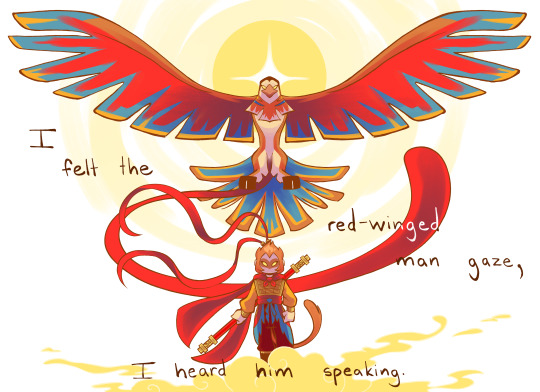

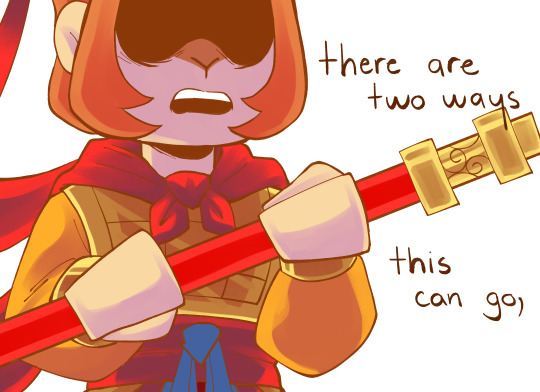

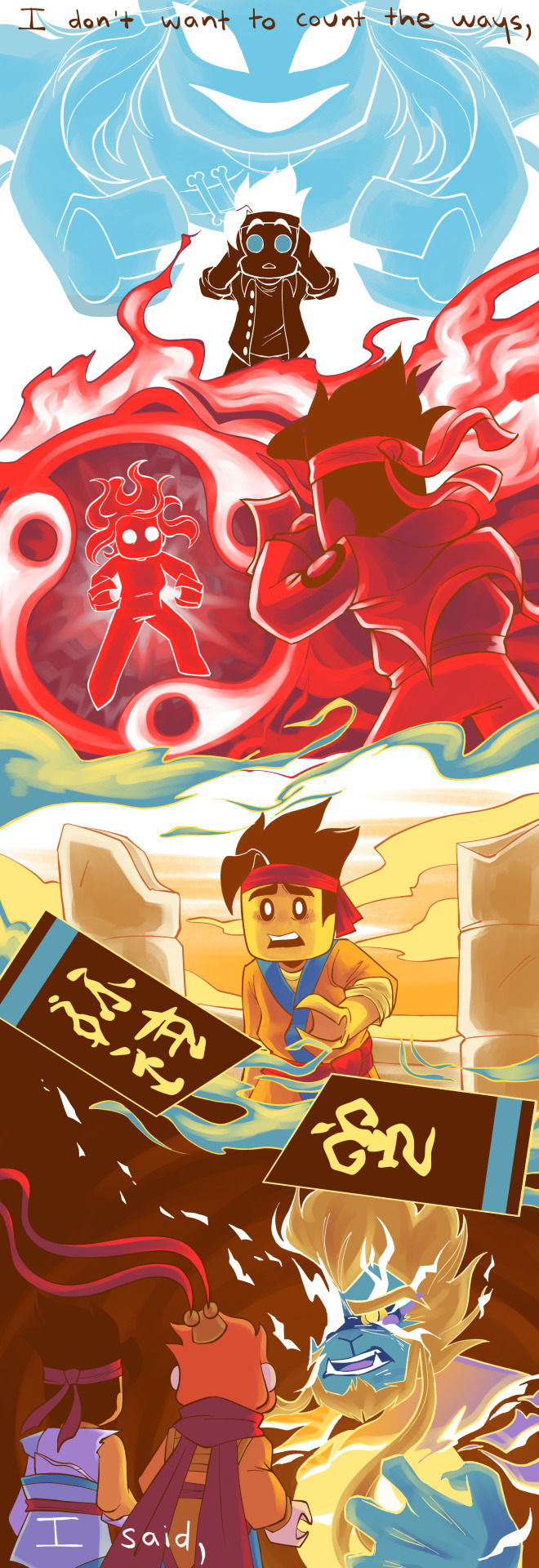
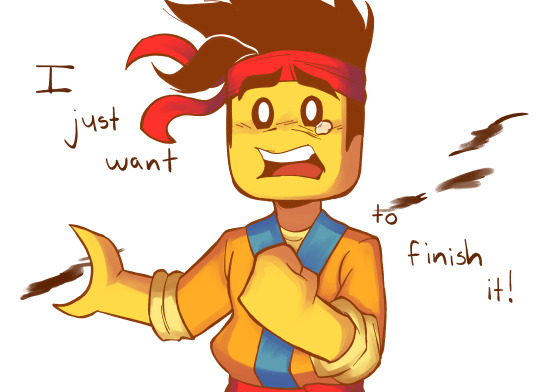
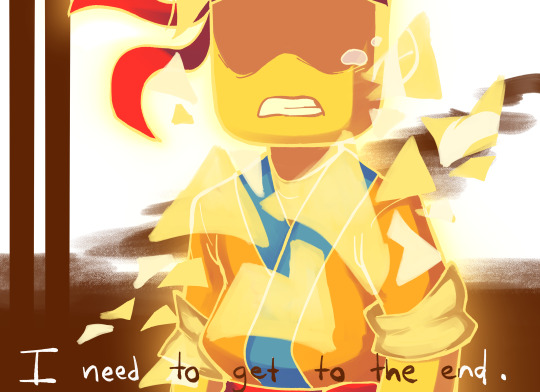

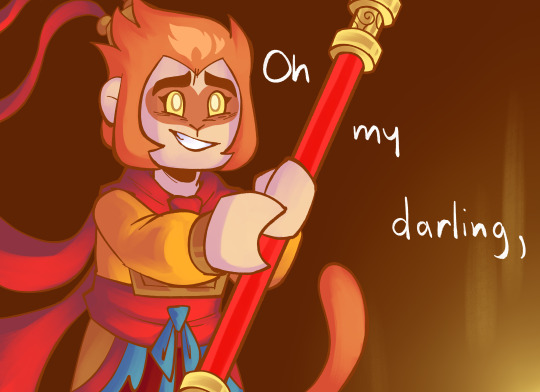
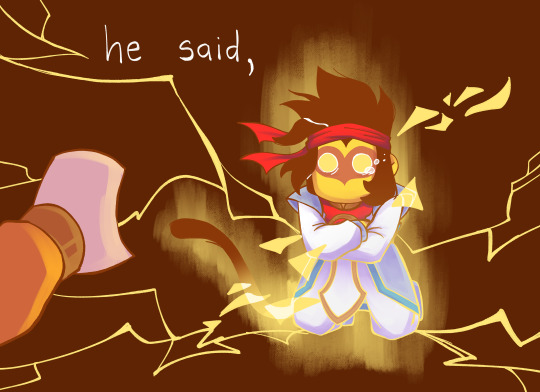
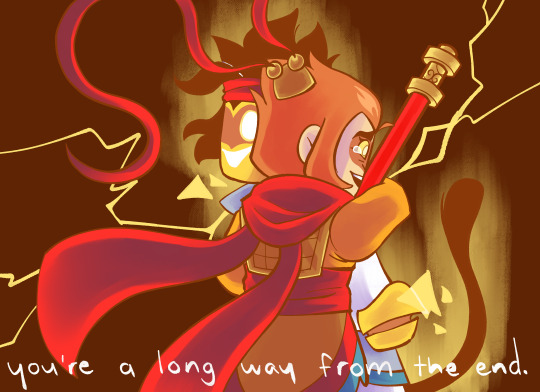
“I felt the red-winged man gaze, I heard him speaking. I know who you are, he said, there are two ways this can go, no, three ways. I don’t want to count the ways, I said, I just want to finish it. I need to get to the end. His wings lifted and sanked. Oh my darling, he said, you’re a long way from the end.”
— Anne Carson, H of H Playbook
#IT'S DONE#FINALLY I AM FREEEEEEEEEEEEEEEEE#Words can not express how heartbroken I am over tumblr fucking over the quality of page 5#whatever#I had initially sketched this back before the s4 special#And then the s4 special dropped and I edited some stuff#And then my motivation wavered#And then lining and coloring and shading takes a while#And I could not for the life of me decide on colors (page 5 my beloathed)#But it's done!!!!!!#Woooooo!!!!!!!!!!!!!!!!!!!!!!!!!!!!!!!!!!!!!!#Me vc: And I think I will make another comic with an anne carson quote#I hope everyone likes my fucked up sunburst duo comic I think it's pretty neat#Also I hope I succeeded in making Wukong look really sad/wet when his eyes get revealed for the first time lol#Also also I hope this comic only ages better with time#''Oh my darling. You're a long way from the end.'' AM I RIGHT. AM I RIGHT!!#Hm. Does anyone here even know I draw lol#lmk#lego monkie kid#lmk comic#lmk art#lmk fanart#lego monkie kid art#lego monkie kid fanart#lmk MK#lmk SWK#the light is no mystery#anne carson#art#my art
461 notes
·
View notes
Text
thinking about how eiji's a pole vaulter and how ash talks about eiji "flying" and how eiji's associated with bird imagery and how eiji's free (unlike ash) and how eiji comes in on a plane and leaves on a plane and how ash cannot fly, ash cannot be free, how nyc is ash's prison, and how ash is the leopard who dies climbing the mountain, unable to live at such elevation, how he was trying to reach the sky and be free but was always stuck to the earth, how he chose to die instead of climbing back down, how he chose to die where he could see the sky and hope and freedom almost like a bird with eiji's letter right in front of him rather than letting everything go wrong and ruin it once again, how eiji's a failed pole vaulter anyway, how a bad fall ruined his career and grounded him (physically and emotionally), how it took flying to america and meeting ash and needing to save him and skip for him to try flying again, how he landed hard and harsh and still the thought of that escape compelled ash to protect eiji at all costs because if he could fly that means something to him, even if he doesn't think he can fly, how eiji is the manifestation of his hope and how when he breaks and asks eiji to stay with him a while he folds himself over his legs and weighs him down and traps him and grounds him, how ash fights like hell to keep eiji alive not because he thinks he can be like him (hopeful, flying, innocent), but because he makes him forget the gravity of his situation, and so he can see eiji fly again. how he wants to see him escape. how eiji is a bird and ash is a wildcat and how ash never once saw eiji as prey. how eiji never saw ash as a predator. how it is eiji's naivete that first endears ash to him, how it is his freedom and flight and removal from darkness and his ability to leave that darkness that really roots eiji in ash's blood as something essential to him keeping on living in this hell of nyc. how it is that distance from the violence and that hope for the future that ash chooses to surround himself in as he dies. how ash dies in a dream because he feels more than anything that he can't fly like eiji, that he can never leave. how his violence is a part of him and will be forever, how it weighs him down. how he wants to enjoy the view from the mountainside rather than looking up from the ground below. as if they can both fly. as if he is with him up there and not grounded. eye-to-eye with what he can't have, seeing eiji's homeland: the sky. how he dies trying to reach the top because he couldn't take retreating and trying again. how ash, tired and tired and tired and convinced it will go on forever if he crawls back down the mountain, chooses to close his life deluged in eiji, in eiji's insistence that they can fly together, in eiji's hope for him and for them, in eiji's beautiful dream. how ash dies without trying to realize that dream. how ash, in dying, destroys it.
#banana fish spoilers#I'M HAVING A FUCKING MOMENT#mutual reblogged exactly one (1) piece of ash fanart and sent me on A Multiple Hour Long Thing and now im rewatching it lol#yes i am only on episode 2 yes i am still going to write big long analysis posts ANYWAY#whatever hope this makes sense. anyway#banana fish#okumura eiji#ash lynx#asheiji#hhhhh i can't believe i've only watched this twice in like what 5.5 years?? sheesh#anywayyyyyyy i care about them a lot ok. god#and yes i DO kinda have beef with the decision to kill ash off at the end but it really does say so much About his character#that he chose to die in the way that he did even though he's been throwing his life away since episode 1#dying in peace in comfort in solitude rather than in some chaotic battlefield.... ough...... in the peace eiji alone could give him.....#anywayss i relate to ash a little more than i should so. this one's for us cool guy bottoms up#edit i uh.... i forgot it was a leopard.... in the story..... but whatever it doesn't really affect the symbolic meaning it's just embarras#ing that i forgot >;/
234 notes
·
View notes
Text
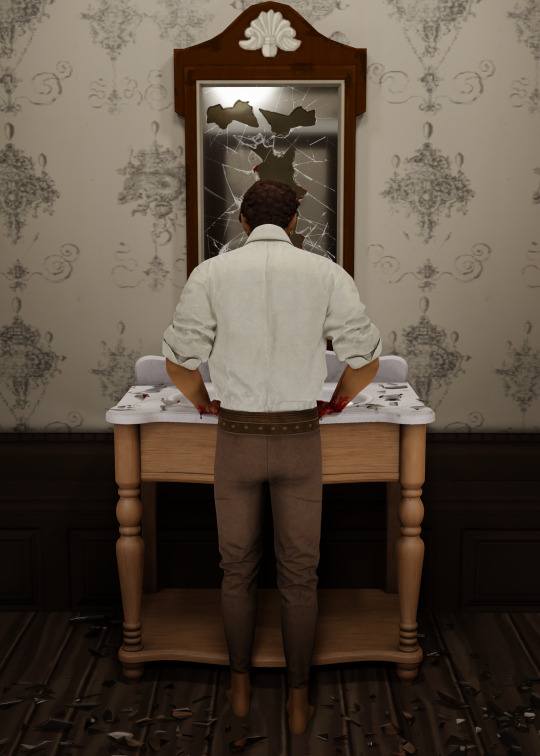
And I forget sometimes I'm just flesh and bone.
As he stands in the ruined bathroom, all Rook can think is, At least now I can breathe.
#ts4#ts4 edit#the sims 4#sims 4 edit#my edits#ts4 render#my renders#blender render#oc: Rook#dnd sims#ts4 dnd#please I beg of you open this in a new tab and look it it. it's 2080px across and I spent way too long on tiny details.#(like the blood on the shards of glass on the sink. and the mirror alone took well over an hour...)#augh I love my boy so much#he's really going through it right now tho#poor bby#but when he's going through it I'm having fun playing him so...#yeah#blood tw#tw blood#so this is scheduled to go up right as we're starting our session picking up from exactly this point.#I thought that would be thematically fitting#please listen to this song it's so good and it's very Rook.#I almost put the lyrics right after this line (''I saw my reflection on the street that night / he said I got something to change your life#/ he said you don't look wrong but you don't look right'')#bc yk mirror shit. But I ended up going with this line instead because it's VERY VERY fitting for the conversations going on w/ Rook.#specifically about his reckless endangerment of himself to the point where some of his party members consider it to be self-harm.#(and obviously punching a mirror intentionally is self-harm.)#but like Rook doesn't see it that way and he's so confused as to why the party is so upset with him. (esp. his mentor and the gunslinger.)#god I could talk about this ridiculous man for hours so I'll stop here.
141 notes
·
View notes
Text
Nothing's Wrong with Dale - Part Thirty-Four
It’s been a week, but you’re fairly certain your fiancé accidentally got himself replaced by an eldritch being from the Depths. Deciding that he’s certainly not worse than your original fiancé, you endeavor to keep the engagement and his new non-human state to yourself.
However, this might prove harder than you originally thought.
Fantasy, arranged marriage, malemonsterxfemalereader, M/F
AO3: Nothing's Wrong with Dale Chapter 34
[Part One] [Part Two] [Part Three] [Part Four] [Part Five] [Part Six] [Part Seven] [Part Seven.5] [Part Eight] [Part Nine] [Part Ten] [Part Eleven] [Part Twelve] [Part Thirteen] [Part Fourteen] [Part Fifteen] [Part Sixteen] [Part Seventeen] [Part Eighteen] [Part Nineteen] [Part Twenty] [Part Twenty-One] [Part Twenty-Two][Part Twenty-Three] [Part Twenty-Four] [Part Twenty-Five] [Part Twenty-Six][Part Twenty-Seven] [Part Twenty-Eight] [Part Twenty-Nine] [Part Thirty] [Part Thirty-One] [Part Thirty-Two] [Part Thirty-Three] Part Thirty-Four [Part Thirty-Five]
“So,” he says, after a sip of tea, “where would you like to begin?”
“I’m not certain,” you admit. Your mind’s been spinning with questions for weeks and yet now that Dale is availing himself to said questions, you find it blank. You grasp for anything to start. Nothing comes to mind besides the very beginning.
“You said earlier… that the original Dale was killed in his summoning attempt?”
“Yes,” the demon inhabiting his body replies. He sets down his cup of tea. “He attempted a summoning ritual, planning to bind a powerful, but unintelligent demonic spirit to him so he might use its strength and other inhuman abilities for his own gain.” That tracked with what you would have expected the original Dale to want. He seemed to have contempt for both demons and his grandparents’ rules, while craving more power for himself.
You’re not surprised it went wrong either as Dale is clearing an intelligent demon. Even while traveling abroad from Northridge, the human Dale likely needed to be covert about his studies and plans. Given the host of misinformation out in the world, well, that probably led to some bad information. His own arrogance likely blinded him to that fact or he overestimated his ability to filter such misinformation out resulting in, well… Summoning demons is very dangerous.
“Unfortunately, he miscalculated in a number of ways,” Dale immediately confirms for you. “Such as how deep he threw his lure down into the portal he opened being the gravest as it meant he underestimated the vitality of his offering. Or rather, if he’d only gone as deep as he planned, it perhaps might have been sufficient. However, since he tried to go too deep, the offering was used up and he’d not set the proper parameters on the summoning circle to prevent an overreach demand.”
Your confusion must show on your face. This is all so far over your head. All your research since discovering this situation with Dale had been regarding what to do with a demon that was present, not how to find or bind one. You’re trying to follow along though and you’re sort of managing, even if you’ve no idea about the mechanics of how to do any of what Dale is describing.
Dale elaborates, “It needed more fuel to the fire so to speak in order to reach as deep as he specified, which was in error. After the offering, the closest source of potential energy was him. Not his body, but his—” Dale made a sound, a hissing air filled noise that you’d never be able to replicate “—, er, his life’s energy? I’m not too sure of the mechanisms myself to be honest. Most of what I know is gleaned from memories of humans who I’ve possessed and that knowledge is incomplete.”
“From what I can tell,” you offer, uncomfortable with speaking on something you’ve not studied deeply, but wanting to contribute something—or at least reassure Dale that you’re no expert nor expecting him to be one. Most of the studies you’ve had covered the Depths as part of history, not science. “There seem to be waves or cycles with knowledge of the Depths. There will be a build up of knowledge in one civilization, an increase in daily interaction between the planes, and then some big shift—a nation-wide purge, a crater where a city once was—wipes out a lot of that gained insight. The topic becomes taboo again, until slowly interest and tolerance builds once more.”
“Fascinating,” Dale says, leaning forward with rapt attention. “I’d not noticed, but I think you’re correct—the sources of information my hosts recall do seem to be clustered in certain years. The cycle isn’t obvious in the Depths because of how time is distorted.”
“I’d imagine so,” you say, enjoying how animated Dale is on the topic. You hope your intrigue is not obvious as you surreptitiously study the two additional eyes which have opened up on his forehead. They’re identical to Dale’s human eyes, despite their placement.
Dale leans back, perhaps you were too obvious, but the eyes do stay. “Something to be explored at a later date,” Dale says sheepishly, seemingly to have recalled his original train of an explanation. “There are some things that are common knowledge among demons—passed on and around as information does even with the Depths’ fractured communities. If a human is drained of energy, there is a small window of opportunity where a demon can leap into their body. We can give it a kick to get it moving again—reignite the spark of life and animation with our own.”
You’d heard of both types of possession–shared and solitary, but you never knew why or how they happened. You’re only grateful that the demon didn’t have to fight the original Dale–you feel guilty, but you can’t help but be glad you’ve only this Dale now.
He waves dismissively. “Of course you can possess a human body with the human’s energy still intact—you’ve met Two—but it's a much more delicate proposition. Often such a prospect involves a fight or negotiation. That’s why so many of the older cults would purposely use a human as an offering. Then the demon they wish to summon won’t have any trouble finding or possessing a vessel.” He again seems to get nervous with such mentions—as if you’ll suddenly remember that you should be afraid of him—and hastens on, “Anyways, there are also ways to do the reverse—to limit a casting, so if the offering is used up, it stops. Dale did not do that properly. He didn’t set the lure right either, which is why he didn’t attract demons that are more akin to animals than humans.”
“I suspected he might attempt something like this,” you admit, remembering your trepidation as the original Dale’s inability to conceal his anticipation had grown. “He was not subtle in his studies around anyone besides his grandparents, but I’m still horrified to think he did so in the estate. If anything went wrong—as it did—who knows who could have been hurt? Is there a way to limit the number of demons that can, can follow or catch the lure?” Your mind is filled with visions of multiple demons, with no regard for the humans already here or even merely not in control of themselves as many animal-like demons often were. It would be like suddenly having a pack of wolves in your bed chamber.
“There is and he managed that much,” Dale confirms and even though the casting is over a month ago, you still feel some relief that you weren't quite so close to complete chaos. “Once I had the lure, I merely had to keep hold of it as these are set to pull in the demon once one suiting the parameters comes into contact with it. He’d made—not noise—but something similar enough that there were a number of interested parties in the area. Luck made me one of the closest once he cast down.”
“But you’d come to see if the noise was a way to the Surface on purpose,” you guess, reading between the lines. You think back to the mood Dale had been in when he’d ‘recovered’ and was showing up to more than a meal an evening. He’d been happy. He’d wanted to be there.
“Yes,” Dale nods. “I’d been looking for the opportunity for long enough. It was a great relief to win the race and fight for the chance. I wasn’t going to let such a lucky circumstance slip through my fingers.”
“How many times had you been to the Surface before?” you ask, caught up so much information. He clearly knew a lot about summoning from Dale’s memories, his personal experiences—but possibly even from other humans. To want to be here strongly enough to fight for the chance he must have known what he was getting himself into—or been in such a rough spot in the Depths anything seemed better. You hoped it was the former.
“A few times,” Dale confirms. He leans back in his chair, his pupils darker in a fascinating way. Not larger, but deeper. You have to watch yourself so you don’t lean forward to see better, like you might find understanding if you fell into his eyes long enough. You force your gaze away and take a sip of tea.
“The first time was by accident,” Dale confesses. “A very skilled summoner from Anjou pulled me and a couple others up. Bound us to her soldiers. It was enough to let me see and experience what it was like here. And to start my fascination.” He shrugs. “Sure, I’d heard of the Surface and humans before, but I’d never seen anything or anyone.”
“It’s not pure darkness in the Depths—I’ve no notion how such rumors began up here—but there’s nothing like the sun and sunlight and its warmth.” He closes his eyes and turns his face towards the window, even though the sun is almost done setting. “Everything feels freer here somehow, less weighed down. As if I’d been moving through water or smog my whole life, in more ways than one—not that that’s quite right either.” He frowns at his inability to describe the experience and opens his eyes to meet yours with perfect accuracy. “My apologies, I seem to lack the vocabulary to explain some of the differences as the effects, the experiences, are not ones that translate well.”
You don’t think he’s giving himself enough credit. “No, no—I think I understand as well as I’d be able without going there myself.”
“I’m not sure you’d like it,” he immediately cautions. Before you can begin to reply that wasn’t what you meant, he’s already hurrying to deter you. “Do not misunderstand me, there are many parts of living in the Depths that I liked. Having my own body and not having to use a vessel. There’s a certain beauty in landscapes and locations that cannot exist here. Comfort in the familiarity of it all. Not to mention the lack of constant deception. However, I’m not certain you would enjoy it.”
“That’s alright,” you reassure him. I have no plans to visit the Depths–you just want Dale to stay here.
“Good, good. It’s…” Dale’s at a loss of words as he tries to convey whatever he wants to. “Well, it’s very dangerous, more wild.” You shiver at the thought, having only lived in cities or large estates in your life–tamed in a manner that you can tell Dale means the opposite to.
Dale frowns, glancing at you and out the window at the nearly set sun before going over to start a fire. You don’t clarify his misinterpretation because the light will be helpful to you, as you know Dale has excellent night vision. Besides, it's early enough in summer that nights can still carry a chill.
Dale continues to talk as he arranges the logs, his voice clear despite his facing away and crouching down, “There are far more animals, for lack of a better word, than intelligent beings. And the intelligent demons are very territorial, in tight-knit clans that exclude outsiders, or in family groups, or solitary. None of these larger communities like humans, with their travel and attempts at civil interaction.”
“What sort are you from?” you can’t help but ask. He seems to enjoy being part of Northridge. He’d talked weeks ago of it as his ‘territory’ but you noticed he hasn’t mentioned anyone else. No one person was mentioned as an aspect of the Depths that he misses.
He straightens up from the fire, picking up his cup of tea for a drink. “That’s complicated.” He sets down the cup holds up his right hand as he explains, “One of my parents was pure shade, but they had been injured defending their territory. During that time they met an ambyani who’d left her family territory to make her own and had settled next to their territory.” He holds up his other hand to represent that parent, before frowning at your blank stare at the word.
You know there are many races of demons, far more varied than any humans are from one another. Some are more famous—infamous— than others. You’ve never heard that word before.
“Ambyani would remind you of humans in a broad sense—most intelligent demons have a form that’s similar enough to humans—but with features that would bring to mind salamanders and birds.” You nod, which you limit yourself to only because you can tell Dale has other things to say besides simply continuing to describe such a creature in greater detail as you wish he would. You wonder if he’s any talent for drawing that he might better illustrate what they would look like. “A courtship developed between them over the years. Eventually they became mates and began to have children.”
Does he mean his parents courted for years before marrying? Perhaps he is interested in such things, but merely expects a longer time frame. You can’t decide whether or not that makes you hopeful or dismayed, so you focus elsewhere. “So different races of demons can have children together?” you ask, even though you suppose he’d already told you as much. You’d grown up hearing about all sorts of demons—wild and strange in so many ways. They seemed too different to be able to have children together.
“Yes, although not always easily and often in adapted manners,” Dale replies. He fidgets, looking as if he’s going to start pacing again, before he sits instead. “The offspring tend to be a mix of parental traits, although the level of influence varies. For example, when a human has children with a possessed human, it is as though the child has three parents, with traits from all, but will end up primarily human because there is more influence from humans. Demons have overlap in their traits, even when different races, and those common traits show up more prominently in offspring.”
You try to absorb what he’s saying about demons, but your mind is a little stuck on the human part, since it's most applicable to you. Another problem for another time, you try to remind yourself. After all, it's not like that information is likely to be relevant to anything happening tonight. Forcibly, you remind yourself that Dale is attempting to explain his own parentage, which you do want to know about and which might help you learn more about him. You’re not sure if your mind can believe that having control over shadows is like hair color, but perhaps it was for demons.
“Shades spawn in swarms with or without partners,” Dale says, not having noticed your mind briefly get off on the wrong track, “while ambyani lay eggs.” You can’t help but notice neither of those methods is how humans reproduce. You try desperately not to picture what mating or sex would be like between such different demons if only because you want to keep listening to Dale. “It can be harder to reproduce between very different races, but my parents were able to raise a clutch with deliberate action, all of whom inherited from both parents.” You’re nodding until he says, “I was not one of them.”
“What do you mean?” Were those two not his parents after all?
“Myself and a handful of other siblings were formed on accident, with a greater portion of shade than ambyani,” Dale says, still not filling in many of the gaps to your mind. You didn’t want to interrupt him with more questions about how that happened in case he was talking around the exact circumstances on purpose. “As such, we grew up as shade do, wandering about in large swarms. We did combine and recombine with less frequency than usual due to our mother’s contribution.”
“But a swarm of bats or a flock of birds are still separate animals,” you can’t help but point out. “You’re saying that shade young are not fully separate?”
“Correct, usually a swarm solidifies into one shade after time passes, if they survive.” Dale sounds wistful as he explains, “However, rather than eventually dying off entirely, being subsumed by a larger swarm, or forming one shade being, we solidified into a group of siblings when younger than is typical for boundaries like that to form. Because we wandered as young shade do, we had strayed far from our parents' territory. We traveled throughout different demons’ territories, never able to stay long and always in danger from predators. Once old enough, we decided to find our parents. I was the only one to survive the journey home.”
Your heart goes out to Dale and you can see that he feels the loss of his siblings at such a young age. You can’t even imagine it. “I’m so sorry.”
Dale smiles sadly. “Thank you.” He fidgets in his chair before standing up. Waving his hand, he tries to downplay the loss, “It’s a blur, to be honest—little moments stick out but I was very young. Still, I missed them and being part of a family. I was quite eager to join my parents.” You’ve got a sinking feeling in your gut, given how Dale is and the sad tone this story has taken, that his eagerness may have been misplaced. “Unfortunately, by the time I returned, I had grown enough that my parent thought I was an unrelated shade, looking to steal their territory and family. I was able to communicate who I was eventually, but they never fully trusted me.”
You wrap your hand around the low footboard of the bed to resist the urge to comfort him with an embrace. He seems too full of nervous energy to appreciate it and this conversation, while relatable in some ways, is also throwing in your face how different you are. Perhaps he wouldn’t want a hug, even if you want to give him one. “Why not?”
Dale sighs, leaning against the vanity. He looks older, more tired. “Between growing away from them and how we—I—was formed, my mother felt there wasn’t enough ambyani in me. She barely believed I was hers. My parent saw me as too shade to be trusted—family means very little to them on its own. He could never truly be convinced I was not a rival to him. My other siblings were quite different from me and followed their lead.” All of Dale’s extra eyes have vanished and the shadows are very still around. His voice is clipped as he says, “After an incident, I realized it’d be best if I struck out on my own.”
You’re not sure what sort of incident he could mean, but given his parents distrust it could have been anything. People looking for a threat tend to find one, no matter how warranted. “Oh, Dale.” He shrugs and turns to stare into the fire, the light casting strangely deep shadows on his face. He barely looks like his namesake in this moment. He looks too far from human.
You want to shake him from this melancholy. It’s not the same, but you know what it's like to feel like a stranger, someone outside looking in, in your own home and with your own family. Your age difference would have been enough to do that to some extent, nevermind your illness. But your parents and siblings had always been around, had always known you were family. Now here Dale is once more outside of his ‘family’, a demon among humans. He had very little from his original identity he could reveal, even if you hope sharing with you will help. The thought occurs to you and you tentatively ask, “I suppose that reminds me of another question, do you wish for me to call you by another name?”
“Hm?” He half turns towards you, but continues to look so clearly inhuman. It's fascinating what light and shadow can do to change a person.
You’re not scared of him, but you are somewhat intimidated by the gap in your experiences. By how much you still don’t know of him as even this basic question demonstrates. “I only meant for when we’re alone, of course. But you must have a name besides ‘Dale’?” As soon as you clarify, you start to second guess yourself. What did you know of demons and their naming conventions? You’ve heard tell that names mean something to them. Or that they use them differently? But what was rumor or fact, you’ve no notion.
“Oh!” Dale turns fully away from the fire, looking startled, and it seems to shock him back to looking fairly human. His eyes, only the two at the moment and in the proper place, still must be the hardest to control. They still seem to have a glimmer of firelight in them. As he recovers from his surprise, he appears to give the question a brief few seconds of thought before shaking his head. “No, I don’t mind Dale.” You breathe out a sigh of relief that you hadn’t accidentally offended him. He continues, “We didn’t have names as such in the Depths, not permanent ones. Names, however someone was referring to you, were to reflect who you were in a context. In this context, I am Dale of Northridge.”
“If you’re happy with that,” you reassure him, even as he gets up to make himself a fresh cup of tea, “then I’m pleased to continue to call you ‘Dale’.” You hand him another packet of tea and he refills your own cup with fresh hot water. “I just want to make sure you’re aware you can share things with me, as yourself.”
“Thank you, sana.” His smile is small, full of sharp teeth, and quite sincere. “I believe I’m starting to get that through my mind,” Dale says as he salutes you with his fresh cup of tea. “It merely seems so novel. Humans are so fearful of the Depths and demons, which is not unwarranted.”
He frowns thoughtfully at you, pausing as he stirs his tea. He squints, a third eye mimicking the motion. “You’re quite smart, and compassionate, and—well, cautious isn’t quite right. Deliberate? Hm.” You wait with bated breath for whatever else he might say of your character. You’ve been wondering how he truly saw you for so long, what he made of such a silly human, and yet he seems far too complementary. “What I mean to say is that you are very sensible and that seems at odds with, well, this,” he motions between the two of you. “Your reaction to me when compared with others. I admit I still do not fully understand it.”
“I’m pleased you think I’m sensible,” you say before frowning because while you’re flattered, you also don’t want Dale to have a false image of you in his head. “But I don’t truly think I am. Sensible, that is. I mostly just see myself as a worrier, but it’s true that I worry a similar amount about what others might see as inconsequential or as monumental.” You shrug helplessly, trying to articulate what you mean. “I think I’m just better at pretending, or rather… I grew up oddly, because of my illness and isolation, in a manner such that the things others saw as mundane were far more to me. And now that I am healthier, I think sometimes because my mind has elevated the ordinary to extraordinary, I don’t find the strange so strange, or the risk as risky.” You wander back to the bed and sit down as you try to pull your thoughts into order.
“It’s true, marrying a demon is risky,” you’ve never actually said it out loud. The closest you came was with Steward Bilmont. It does sound incredibly foolish, even with Dale patiently waiting for you to keep talking, the picture of normalcy—baring the now three additional eyes. “But so is marrying anyone, to some extent. Certainly so is marrying an ambitious lordling who dabbles in forces he overestimates his abilities in. I knew what he was like when we entered into our betrothal, but considered it a price I’d pay, a risk I’d take. I wanted to attempt to run a fief and have a family of my own where my decisions held weight. My other options had not had such possibilities.”
You think back to when you figured out what was going on and what Dale was. What you wanted to do. “You were a new player to account for, but I already knew Dale wasn’t a prize himself. You could have been anything—for good or ill—and Dale was already part of the marriage to bear, not what I was looking forward to. Given the other alternatives, I thought seeing if you would at least be as tolerable as him would be worth the risk. If it did not work out well, I would deal with it then.” You shrug helplessly. “I think I’m just too stubborn by half and twice as foolhardy. A month ago, when this part of everything began, seems so long ago. But I’m very happy with where we are now and with you.”
“Is that so?” Dale can’t seem to help himself from asking.
“Yes.” Luckily telling him so gets easier every time.
He leans forward to peer at you, unblinking in his examination. Your breath catches in your chest as you wait him out.
“So strange, you really seem to mean it.” He looks away to stir his tea.
You find you’ve leaned towards him and are in danger of falling off the bed. You hurriedly hoist yourself back a sensible distance so you don’t look quite so eager. Hopefully by the time he looks back at you the heat in your cheeks can be blamed on the fire and tea.
“Some humans have used me as a tool, others a weapon. Some were civil about it, others were not—whether using bribery or punishment to attempt to deal with me. None dealt with me as an equal.” He says so casually enough it takes an additional second for the pang of sorrow for his sake to hit you.
He looks back up, that earnest light in his eyes. “Despite all that, I still wanted so badly to be here. After the first taste, I tried to learn everything I could of the Surface. I’d not managed to join a new clan or other group by then, so I started trying to mark out my own territory in the shallows. Where I might see more of the Surface. I even attempted to find a way to go it alone up here, but shades are just a bit too… delicate? We need an anchor—a vessel—or we fade.”
“So you focused on humans who cut holes into the Depths,” you surmise, even if you feel a pang of disappointment that you’ll never see him without Dale’s human body, on his own. You wonder if the brief glimpses you saw during his fight with Two were close to what he looked like naturally. Maybe you could still see some of what he was underneath.
“Precisely,” Dale replies. “I learned better how to spot the lures humans dropped, how to tell who they were aimed at and how powerful the one casting them was and so on. Not that I was always correct in my estimation and there are others—other demons—who want to go to the surface as well. Even ones who might be able to in their own forms tend to still prefer to travel up a line a human dropped to ascend. Competition was fierce.”
You try to think of what to ask, without making it obvious you want to know everything he could tell you. Hopefully he would, eventually, but what did you want to know tonight? “Were there any other journeys here that you thought might have been what you wanted?”
Dale frowns before he slowly nods. “One. Time moves differently between the planes and matters less in the Depths, passes differently too so I can’t say for certain how long ago it was. Decades on the Surface,” he settles on, “but less than one below.” He sighs and there’s a little whistle to it that makes it sound more like the wind than a human letting out some breath. The whistle is eerie and pretty at the same. You want to know what other sounds Dale can make. “It did not work out as I’d hoped, but it was the closest I’d come.”
This is the most wistful you think you’ve ever heard Dale and you are so eager to learn more. “What happened?”
“You truly wish to know?” Dale’s not arguing with you, but you can see he doesn’t understand your interest in this. You’d thought this is what he wanted to share, but maybe he was expecting questions more along the lines of the specifics of what he is or what his plans are. After this morning and the wedding, you’re not nearly as anxious about that as you were yesterday. You don’t need reassurances he’s not going to hurt you or leave. You merely want to know him better.
“It has no bearing on the current state of affairs. I promise I’ve no desire for another life,” Dale reiterates, looking earnestly at you. “As I said, this was the finest stroke of luck I’ve ever come across.”
You can’t help but smile because honestly, his arrival ended up being a pretty perfect stroke of good luck for you too. “I believe you,” you reply, hoping to soothe him. You’re not deterred. “But these events had an impact on you, did they not? A strong impact.”
“Yes,” he allows. “They did.”
“I only want to get to know you,” you say, hoping your unadorned words will help him understand you.
“Very well.”
You frown at his continued reluctance. “If you do not wish to tell the tale, I’ve no desire to force you.”
“No, no.” He shakes his head, his hand brushing some of the hair that’s escaped his tie back from his face. “It might clarify some of my actions to you.” You still are not convinced he wants to speak to you of this. You can have patience. You open your mouth to say so, but Dale admits, anticipating your words, “And I’ve never had the opportunity to tell this story to anyone. So if you wish to listen, I will gladly tell of it.”
You are getting better at reading him after all, you realize, be cause you believe him. You relax back onto the bed. “Yes, please.”
“It was in Khinat, though the group was not entirely from there,” Dale says, setting the scene. The far off look is back in his eyes, the shadows’ movements more rhythmic than the typical chaos from a fire. “They were a band of thieves, who wanted to steal, well, a number of precious items from a palace.” He gives one slow blink, as if giving you a second to object to such criminal behavior. As if you weren’t aware most dabbling in demonology that weren’t scientists were mercenaries and the like. You doubt he had much choice in the matter and theft was always more palatable to you than harm caused unto others—not that they couldn’t overlap.
When you only wait patiently, Dale continues, “They wanted more than human advantages on their side. Their caster bound myself and two others to three of their fellows. My vessel, he did first. He’d not been sure of how much energy it would take to get the depths he wanted and so he had that human written in as a secondary sacrifice. Sure enough, he’d not provided enough energy and the human’s life energy was drained in the summoning process. It was the first time I’d been in a vessel with no mind to compete with beyond memories.”
“That caster had been a foul man, callous and arrogant,” Dale flexes one of his hands angrily at the memory before clenching it into a fist. “He bound me tight in that body. The other two demons he summoned were controlled by their humans with excessive strength. One human was able to handle it properly. The other was not and did survive to the end of the quest. The one who survived kept the demon bound to him as his reward while I was told that I could have the human body and my freedom if I cooperated. I saw this as a great opportunity, even if I disliked most of the other members of the group."
“I can understand why," you acknowledge. It was obviously more appealing for Dale to not have to share a body, even if it meant someone else died—at least it was not by his own actions. It certainly painted the humans involved in a negative light, cruel to sacrifice someone in such a test and then use their body after their death. And while you know demons can be violent too, this manner of binding stinks of slavery to you. "Even if they sound like a reprehensible crew."
“Yes. There was one who had been, not captured as the one who became my vessel had been, but coerced to a high degree,” Dale says. You sit up straighter at the gentler tone that has entered his voice. "She was the appraiser—the one who could tell the decoy artifacts from the genuine. Rather than wait until after the heist, the leader compelled her to join with a combination of bribery and threats. She needed the money, and wished to keep her life, and so complied."
Dale seems to be lost in his memory and so you only need to nod to prompt him to continue.
"I performed reconnaissance and scouting. She utilized that information to ensure we had the correct targets. We became close over the time spent together, preferring each other's company to the rest," Dale's voice gets even softer and you hate the insecurity it sparks through you because you can see where this is heading. You don't like discovering you're a jealous spouse—you hadn't been with the original Dale, but then again, you'd not truly wanted him, or wanted him to want you, the way you did with this Dale. "She knew the terms of my service, that I would get only my freedom and nothing more, so she invited me to return with her to her hometown and then beyond. She was taking this payment and leaving her life in the city behind. A fresh start for both of us, she said.”
You could see why such a prospect appealed to Dale, and possibly even to this woman, who sounded like she had found herself in far over her head. You’re waiting though, balanced on the edge of a cliff, because you know by virtue of Dale standing here with you, that this story will not end well.
"It was the longest I'd been on the surface for and had full control,” Dale says, lost in the memories. “I learned and enjoyed as much as I could, even under the circumstances.”
You can picture Dale, not having to hide his nature with the crew, and testing his limits with the same eager attitude he sometimes displayed.
“Not that the lessons learned from the rest of the group were useless,” Dale adds, coming back to the present somewhat. “I’ve been applying some of those skills recently to the investigation into the assassins.”
You blink, pulled out of Dale's story. "You have?”
"Yes," Dale says, as if still worried what you might think of this part of his past. Like he wants to show he's useful beyond his impersonation of Dale, which has never something you needed convincing on. "Of course, I’ve been trying to pull what useful information I can from Dale’s memories, his knowledge, of his network of informants, and so on, but I do know something on my own of information gathering, of meeting with unsavory characters and how they operate. Ensuring those I have contact with can and cannot tell I am Dale as appropriate."
"I'm glad you've had the experience because I don't know where I would have begun," you admit because you are and you want him to know that you value what responsibilities he’s taken on. "My family might help if I had asked, but they are busy with their own matters. I certainly have no network of contacts, especially not for figuring out who might have hired assassins."
"Yes, well, you would not have acted in a manner that would prompt someone to send assassins after you."
You smile at the affront you hear in Dale's voice. "I'm glad you think so. I don't think if you'd been Dale at the time that you would have either."
Dale gives you a lopsided smile. "I'm pleased you think so, but I'm not so certain. There's still much I'm learning and my experience, my loaned memories—they are not always the correct preparation. I'm grateful to your aid and Grandmother and Grandfather for their clear expectations. Besides, as you've pointed out—rightfully so—my control still needs fine-tuning. Within Northridge, that’s the greater concern.”
While you've worried over the same thing yourself these weeks, here in this room—with Dale, and honesty, and your marriage—you no longer feel like that’s a true looming threat. “Now that we can work together, I’m certain we can prevent that from happening.”
“Thank you for your confidence,” Dale says, pleased. “I’ve simply never been able to stay and so inherently find the prospect hard to trust in.”
“I’d imagine so,” you reply. “From your story, it seemed like a true possibility, but you weren’t able to stay, were you?”
“No,” Dale sighs. “It was a lovely month—my longest stay until now. We did succeed to the leader’s satisfaction and he paid us both as promised. Even the journey to her home was uneventful. At first. That’s when it all fell apart.”
Even knowing that something was going to go wrong, it still made your heart clench at the despair in Dale’s voice. That he was here now, meant that he couldn’t have stayed then, and you selfishly want to be the one—want this life to be the one—that makes him happy. You still hurt for the hope you can see he had and lost.
“While I thought she understood my situation,” Dale continues, “it turns out she had not.” You frown, what did he— “She thought I was like the other two, a human sharing a body with the demon, except that I hadn’t asked for it the way the other two had. She thought freedom meant the caster had rid me of the demon, not that I was the demon being given a body. She thought she’d been talking with a human the entire time.”
Oh, your first thought is once you’ve digested that, no wonder he hadn’t thought you knew. He’d deceived this other woman by accident. Perhaps that is even why he seemed so careless—why he’d called humans oblivious. He’d said before he’d been testing his limits of what he could do and she’d still not caught on. She must have been shocked, particularly if her experience with demons had been tainted by the other members of the group. “Oh, oh no.”
Dale nods, resigned sorrow in the lines of his face, aging him. “When I finally realized what was happening, I told her the truth.” His voice flattens, “She did not take it well. Refused to believe me at first. She was angry and unsettled and—but then,” the corners of his mouth lift in a facsimile of a smile, “she seemed to accept that I had been myself the entire time. That our relationship was genuine. She was a little more standoffish, more hesitant, than before but she was a good person. Forgiving. She still wanted me to come home with her. She didn’t abandon me.” You can hear a lot in that statement, thinking back on his family.
“I thought given time,” Dale continues softly, “she would be able to accept me. And so I followed her home, right into an exorcism.”
Your eyes widen and you can’t help but get to your feet. Carefully, you approach Dale. He watches you with wary eyes, but doesn’t move away, doesn’t ask you to stop. “She’d written home ahead of time,” he blurts out and you reach out your hand to entwine your fingers with his, giving his hand a squeeze. You know he can appreciate this much at least. “Her mother, a sanctif, set everything up. She believed I’d deceived her purposely and was still attempting to use her to some nefarious end. I was shoved back down into the Depths within the day.”
“Dale…” You say, running your free hand down his arm in what you hoped was a comforting gesture, but you’ve no idea what else to say. No wonder he hadn’t believed you knew.
“I thought I was so clear with who I was!” Dale exclaims, looking frustrated and sad. The shadows flicker, and his teeth grow sharp, and his hair seems to have burst from its tie entirely. His fingers stay entangled with your own and his grip is so light. It’s primarily you holding on to him. “And she was so kind, so understanding. We’d known each other for weeks. She saw me—”
He cuts himself off with a frustrated growl. You feel the sound through the close air between you and through his body. You don’t know how to make him feel better. Had he said he’d never even spoken to anyone of this? It all must be so bottled up inside him. You hope talking about, telling you, is releasing some of the pressure. You want to pull him into an embrace so badly, but you don’t think he wants much more contact than this.
He inhales, a shiver that goes through his entire body before he stills. He pulls his inhuman influence back into himself that the room seems more static than before, like a painting of a room instead of a true one—Dale, a statue. He looks down at you with his glowing blue eyes, only two of them, and mostly looks forlorn. “And she was convinced that she did what had to be done, I could see it, once trapped. The righteousness in her. Looking back, I should have realized her concerns over what we were doing, how the demons were used by the other humans—she had been disgusted with the use of them, of me. I simply thought it was the binding, the control over another, she disagreed with. In the end, I think she was a purist, who thought none should cross the planes and all should stay in their own realm.”
It was a popular belief, one that waxed and waned throughout the centuries but never truly went away. You sigh and keep your hand on Dale’s arm, not his cheek. “I’ve heard of that school of thought. I’ve never studied much about the planes or demons, not enough to have a strong opinion. I know there is a lot of danger when realms mix, but I also think that those are the instances everyone hears about because if there are demons here or humans Below that are doing just fine, well, there’s nothing to say or hear about, is there?”
Dale relaxes at your every word, at the way you continue to hold his hand, stay close—not move an inch from his side. “Yes, that’s my stance as well.” He frowns, “Do not misunderstand me, there are plenty of dangerous individuals who are a perilous risk to all around them, regardless of where they are and what they are. Demons have done serious harm on the Surface, but humans have been to the Depths and done damage too.”
That’s not something you’d considered, though you’ve heard tales and speculation of those who ventured there. You know Dale knows this, but he must feel so defensive given the attitudes of so many, including that woman and his grandparents.
“In the end, I can only speak for myself. And I wish to live here.”
You take his other hand in yours and clasp them both. “You do live here now. We’ll work together to make sure it stays that way. I can help so much better now that we are on the same page, I promise.”
“Thank you, sana,” Dale replies warmly, stroking the back of your hand with his thumb. “I now know you’ve already been doing more than I ever expected. I admit I didn’t entirely follow all of what you said about what aid you have provided over this past month—besides the holy water. I take it that now it was your intention to be the primary target?”
“Yes, I didn’t know Grandfather had holy water,” you admit with a shrug “but the gesture, the fall… It struck me as suspect so I reacted without thinking.”
“How else have you helped?” he asks, heartfelt gratitude in his voice. “I have done my best, but I’m still learning. Dale’s memories—my own from my other visits—are a great aid, but I can’t always understand why certain things are done or what human limits are. I estimate the correct action as well as I can and hope small slips do not arouse too much suspicion.” He shrugs helplessly. “I don’t know what else to do.”
“I imagine so, I would never be able to maintain any such deceit of my own person.” The very idea of spending the rest of your life pretending to be someone you’re not is exhausting, but somehow helping Dale do the same seems so much more manageable. “I’m happy to aid you.”
“When else have you, if you don’t mind my asking?” Dale insists. “If I’m far more oblivious than I’m beginning to suspect, you need not enumerate all such instances if you’d prefer to go to sleep at some point tonight.”
You smile at his self-deprecating joke, but you’re not one to boast of your own accomplishments and you’ve no desire to make Dale feel worse—your reaction this morning had been quite enough. “I…” You want to fidget but you don’t want to let go of Dale’s hands. “I tried to help where I could as an unfamiliar person to give you time to work through your memories. Then as you said, your control isn’t perfect. Most of what I did was merely misdirecting others from noticing additional eyes, strange shadows, hungry shadow tails with a penchant for cheese.” You give him a significant look at that one and he looks mischievously unrepentant.
“I get hungry!” he defends himself. “I need a lot of fuel to keep myself and this body running smoothly.”
“Clearly,” you reply dryly, although you note it for later. “Other than that, some of Grandfather’s attempts to prove I’d cursed you were aimed at me, but some were aimed at both of us or were in danger of affecting both of us. You managed the High Sanctif fine on your own, but I did ensure we were away from Dr. Louisa and Grandfather after you touched her detecting gloves.”
“Her what?” Dale asks, baffled and curious. An additional eye opens below one of the usual ones, already trained on you.
“She’d just given a demonstration before you and Grandfather joined us. Your hands were stained due to some substance she developed.”
“Oh.” All his eyes blink. “Now that you say so, I did notice a bit of a stain when I retired for the evening, but I thought that was from ink. No wonder I couldn’t recall when it had happened.”
“Quite.” You search your mind, for other instances, feeling strange laying them out after working so hard to conceal them. “I tried to help you gauge your strength with the games before the tournament so you did draw suspicion with the jousting itself. Not telling everyone what else I saw of you during the fight with the assassins wasn’t a challenge—especially since I didn’t see that much as it was. I did try to ensure I helped treat your injuries first, in case you needed the time to regain your control or were injured in some inexplicable manner.”
“I appreciate that, sana,” Dale says with a warm smile and an emphasis on your ‘healer’ nickname, “but I did make sure not to return until I was entirely human, knowing I might be under heightened scrutiny. In some ways it was easier that night since I was tired from having used so much of my demon attributes in the fight and chase. Too tired and I’ll get sloppy—that’s why I only was in public for short periods right after taking control of Dale’s body—but there’s a sweet spot, or so it seems.”
“I’m relieved you’ve managed as well as you have then,” you reply with a crooked smile, “even without exhausting yourself.”
“Still, obviously I have not been doing as well as I’d presumed.” Dale frowns, “My sense of what humans will notice is obviously skewed. I’d appreciate your help in—”
A crackle and pop from the fire as a log shifts and falls in the pile cuts Dale off. He lets out a strange noise, a growl but lower register and more of a continuous, less rough sound. Like a hiss. The shadows writhe around him. He lets go of your hands to put himself between you and the fire, one shadow in particular shoots out like another limb or a tail to wrap loosely around your shoulders, the end of it facing the danger.
Hearting beating wildly from the noise and Dale’s reaction, you try to calm your breathing. “Just the fire,” you say, then fear creeps down your spine. “Right?”
Dale looks at the fireplace for an extra second, before he deflates, pulling back in on himself. “Yes.” He looks at you cautiously, as if wondering if you’ll judge him for overreacting or for showing so much of himself when you were just discussing how he needed to do better at just that. “I apologize. My form is quite instinctive.”
“It’s alright.” You place your hand on Dale’s upper arm, turning him back towards you. “I think we’ve both been on edge these last few days.” You want to get back to where you were, sharing and together. You want him calm once more because he deserves to be after the journey to get here. “What do you mean by instinctive?” you ask, wanting to know more, wanting to figure out the right way to tell him that it was okay. You didn’t mind. His inhuman traits might still surprise you, but they never frighten you. He’s mesmerizing and thrilling and so much more than human. It's actually one of your favorite things about Dale.
He takes a measured breath, clearly wanting to follow you back to normality. Well, normality for you two. “While anchored to this body, my essence is still mine to command as well. It flexes and forms according to my desires and instincts as it did when I was only a shade. I try to keep that within or hidden, however...
You wait with baited breath, so interested in anything to help you understand the most obviously inhuman part of him.
“If I am curious, I create more eyes with which to observe. If I need more reach, I grow more limbs.” His lips quirk, as if remembering what you said earlier, “If I am hungry, more mouths.” You smile in recognition. Dale continues, a frown you recognize as one where he’s trying to translate what this means for him into meaning you can parse, “In many ways, trying to control such manifestations is anathema. Attempting to maintain a neutral facial expression when someone is trying to make you laugh.”
“I see.” It’s a helpful comparison. You remember the games you played in your dorm—including that one. Everything thinking of ridiculous or scandalous things to say in order to make the others break and laugh. It also makes his reaction of putting himself between you and potential danger all the sweeter. “Then perhaps I have not given you credit for the control you do have.”
“I’m sure you’ve given me precisely the credit I deserve,” Dale says wryly, some stress leaving him as he speaks. “It sounds like this is the aspect of my deception you’ve helped most with and I’m grateful for it. I’m grateful to be here, with you.”
“Me too.” You stare up at him, feeling the firm muscle of his arm under your hand, the tightly wound tension still present despite your attempts at reassurance and distraction. You want to truly take his mind away from everything, more than you want that for yourself. You want to relieve the stress you’ve both been under, enjoy what you now have. You want to make Dale not just grateful for not being betrayed, but truly happy—with you.
A clock strikes the hour, obvious as it breaks the silence between you. Dale steps back, picking up his forgotten cup of tea. “It’s getting late, I don’t mean to keep you awake after such an eventful day.”
“I’m not—” you start to protest before cutting yourself off. If Dale wanted a polite path out of tonight’s typical obligations, you should let him. You muster up a small smile, hoping what disappointment and frustration you feel reads as exhaustion. “Yes, I suppose it has certainly been a long day.”
You walk over to the tea table to put down your cup, gathering your leftover supplies. Telling yourself you’re not stalling in the hopes he changes his mind and wants you as a spouse and not simply a confidant, however much you’re enjoying being one to him.
As you move, you’re uncomfortably aware of your chemise. Despite being soft and well made as it is, you feel awkward in your nightclothes. A pretty, but slipshod attempt to make this night something Dale never wanted. He’s still in his waistcoat, for star’s sake.
The garter you’ve on around your thigh is the most uncomfortable and you try to remember if your maid had actually tied it with a purity knot. With a pang, you recall her checking it was still tight when she helped you out of your other clothes after arriving here. Surely, you could figure it out on your own despite its supposed notoriety for being unable to be done by a person who can’t see the knot itself. That’s why it was tradition to do up a betrothed’s garter with it.
But what if you couldn’t? What would be worse? To ask Dale for his help now so you might leave with some dignity after it was undone? Or to leave and have to return for his aid then? No, worst would be to do neither and have your maid be the one to untie it in the morning and know you weren’t enticing enough to tempt your husband into doing so himself.
Regretfully, you turn around, back to where you’d been sitting earlier. “Before I go to bed,” you start, lifting your foot to place it on the ottoman at the foot of his bed.
“What are you doing?” Dale cuts you off, his voice raising in alarm at the end of his sentence when you begin lifting the hem of your chemise.
You give him the driest look you can manage, hoping it hides your embarrassment. “It’s our wedding night, Dale. No one else knows we’re discussing your inhuman nature. They’ll assume we were occupied elsewise. And they’ll ask you about it.”
“Ask—,” Dale sounds personally offended, as if he’s forgotten how certain people will act—because they’re nosey or crude or lack tact. “Not in any sort of—,” he stops and starts again, staying rooted to where he stands instead of making himself useful. “You don’t need to—”
“The garter was tied with a purity knot,” you cut him off before he can continue to prove all your communication issues are not over by not taking a hint and damaging your ego at the same time. You try to remind yourself of all the compliments he’s paid you instead reading into the look of mild panic on his face now when confronted by the mere sight of your bare leg. “I need your help taking it off.”
“You do?” his voice sounds a bit weak, almost reluctant, and you swallow down another wave of disappointment and embarrassment.
“It was tied very tightly and specifically,” you say, grateful your voice, while a little strained, is otherwise close enough to how it typically sounds. “I can’t manage the knot, especially since it’s behind me. You should probably have it regardless.”
Dale blinks and some of his frozen posture thaws. He has that look you’ve seen multiple times, especially in the last few hours—he’s remembered some bit of human knowledge. Hopefully, he chalks this whole experience up to an oddity of humanity and nothing further. “Of course, yes. I don’t know how I forgot about this. One of my cousins tried to convince me to wear one as well this very morning—Grandfather didn’t leave me alone once I told him I would be getting married after all.”
You have to work hard to keep your facial expression from showing how pleasing you find the image of Dale with a matching yellow garter on his leg that you would have gotten to carefully untie, like a present on Midwinter.
He walks over to you, less nervous, but still cautious. You resume pulling your chemise up, hoping he doesn’t think this is some sort of deliberate seduction—caught between hoping you don’t look foolish and wishing he at least found you somewhat pleasing.
Carefully, you hold up the hem to just above the garter, the lace feeling even tighter to your skin. You have to suppress a shiver when you see Dale’s eyes on your bared skin. He reaches for you, a single finger twirling in the dark blue ribbon—which matches his own suit. His eyes dart up to your own for a split second, his pupils already noticeably dark and blown wider. You know they don’t react like humans do, and probably only mean he’s trying to see in better detail, but you feel goosebumps break out across your skin.
He finally grasps the garter itself and gives a little tug to turn it so the knot is towards the front. It’s tight enough that he moves your leg more than the garter. You murmur an apology, one hand on the low footboard of the bed to try to hold yourself steady.
He shakes his head, waving off your apology. “Why on the Surface is this so tight? My apologies for not helping you with it sooner.”
Your own dismissal of his apology is cut short when he wraps the fingers of his right hand around your upper calf, right below your knee and tries again to turn the garter. His grip is strong and unyielding, keeping you in place for him to work and making desire pulse through you at the obvious display of strength. He gives up when the garter’s only made a quarter turn. Since he’s at your side, that must be helpful enough.
You swallow down a bereft noise when he lets go of your calf to use both fingers on the laces. Carefully, he pulls out the ties’ ends from where they were woven back into the garter—another reason they’re hard to undo by oneself. Then he sets to work on the knot itself, his fingers continuously brushing your skin as he tugs and pulls.
He’s so close to you like this, practically looming over you, crowding you against this end of the bed. It would be so easy to fall and bring him with you, on top of you. A knot of a sort twists itself between your legs from his proximity and his touch. You desperately want him to untangle that one too.
He leans closer to see better and it's so unfair. Why has the universe let you get so close to what you want but left you unable to grasp it?
Dale’s noise of triumph causes you to look back down at him as he slides the garter down and, with even more room, off. “There we go,” Dale says, his voice low and soft, with a little bit of smug pride at having finished his task. Before you can lower your leg, he hisses in sympathy. You look down to see lines pressed into your skin, a stark reminder of where the garter had been.
You can feel blood flowing back into that area and it hurts more than it had before Dale had untied the garter. Dale reaches back out for you and rubs his fingers over the marks. “This must have hurt, my apologies once more.”
You shake your head as you fight to keep your eyes from fluttering in appreciation of Dale’s strong fingers massaging that part of your upper thigh back to life. “Thank yo—” you cut yourself off with a gasp when Dale’s fingers drift to the inside of your thigh, which is far more sensitive—not to mention how much closer it begins Dale to where your appreciation is making itself known, gathering at the apex of your thighs and threatening to drip down to where Dale can’t help but notice.
Another stroke of his thumb provokes a hum of pleasure from deep in your chest that you can’t contain. Dale breathes deeply before he finally looks away from your thigh to meet your eyes. You can’t even see any white left in his eyes: his irises are a vibrant blue, glowing with soft light, surrounding dark, wide pupils.
He’s not breathing at all anymore, which you only notice because you have to resist the urge to pant. Then he lets out a sigh, his voice like the wind as he breathes, “You’re so beautiful.”
“You, what?” your voice is high and breathless as he leans closer. “Truly?”
“Yes,” his reply is swift, barely having to think about it. “Of course.” At your continued look of wide eyed surprise, he elaborates, “I was nearly ready to retract my calling off the wedding, no matter my attempt at being better than my nature, when you came to see me simply from how you looked alone. The reminder of what I was giving up.”
His eyes slide up and down your form, before he leans so close your foreheads are nearly touching. His voice is low and almost distracted as he says, “Dressed up so pretty for me.” He moves one hand from your leg to tuck one of your curls behind your ear. “My healing ray of sunshine.”
Heat shoots through your veins at his half-lidded gaze, at his words, at his breath on your lips. “Dale…” Your voice is pleading to a degree that surprises even you. You don’t have time to feel self-conscious about how needy you sound when Dale groans in response, his lips covering yours the next instant.
Soft but insistent, he pushes everything away except for the feel of him pressed against you. The hand still on your thigh, gives a little squeeze, while his other hand cups your cheek, as he’d tried to this morning. He pulls away for a second and your hands wrap themselves in his waistcoat to keep him near. He seemingly needs no persuading as he goes in for another kiss.
His teeth, sharp as they are, tug only gently on your bottom lip, little pinpricks of sensation that send shivers down your spine. You push your hands up his chest and onto his shoulders as you open up to him with a sigh.
His tongue is hotter than the rest of him as it slides into your mouth and you melt in his grasp, wrapping your arms more fully around his neck to keep yourself some semblance of upright. Your pulse thrums with desire as he moves against you and it's all you can do to hold on tight. The flick of his tongue sets your blood simmering. His thorough kiss ignites a hunger in your bones. He pulls back eventually, remembering you both need to breathe, but you don’t care.
You’ve spent so much time at his side, unable to go after what you truly wanted, ask for what you truly want to, that you tighten your hold on him as best you can so he can’t drift away again. Without realizing it, the word “please” falls from your lips to linger in the shared air between you.
Dale’s head tilts back, which is the opposite of what you want, but it seems it’s only to better look you in the eye. “Yes?” He looks startled, despite how you’ve been acting, but eager.
“Yes.” You nod emphatically, past the point about appearing foolish as long as he understands.
“You’d taken this so well,” he says, that same bewildered hope that had sprung up when you said you wanted to marry him back in his eyes. He kisses your skin just below your ear while his hand slides up your side. “I didn’t want to press my luck.”
He captures your mouth in another deep kiss, seemingly unable to help himself
“Uh-uh,” you say once you have a moment to breathe and the wherewithal to speak. You feel drunk on his kisses, the rest of the world and its concerns lost in this heady haze. “This is my reward for getting us here.” Somewhere within, you find the courage to ask, “Haven’t we earned it?”
“More than twice over,” Dale breathes before he sits down on the bed and holds out a hand, “Come here.”
#my writing#story: nothing's wrong with dale#story part#nothing's wrong with dale#monster romance#terato#exophilia#osha compliant#monster bf#reader#arranged marriage#slow burn#this was a beast to write and worse to edit#its so long#its 11k#i would break it up but we're so close to the end#and i put in the chapter count ages ago and want to stick to it#hope you enjoy the lore and backstory and that its not too rambly#but after going so long without actually talking about things i think they deserve it#and well#the next chapter too ;)#only one more left#hope u enjoy!#ps if ur looking for the fade to black ending#that would b this chapter
265 notes
·
View notes
Text



sleepy morning with the boys
#ts4#simblr#ts4 edit#ts4 render#sims 4#myedits#kelly#dhestyn#i apologize for the long post#this originally had 6 photos for a grid format but#i don't really like the other 3 so. yea.#full disclosure it is actually very rare for kelly to wake up at the same time as dhes#kel is literally a cat. he will sleep 16 hours a day if dhes lets him#& dhes gets out of bed at like 4:30/5 every morning#he'll cook a full breakfast & do a load of laundry & go for a jog before going to work#he also usually feeds duder bc if he doesn't she will yell & bother kelly until he wakes up#kel has to be woken up gently or he'll get cranky lol#he tends to wake up later in the morning & pick up lunch for everyone at the shop before walking to work#then the boys will drive home together at the end of their shifts#dani kind of just lets them come & go whenever they want. they mostly make their own hours#she doesn't care as long as they show up for work at some point
154 notes
·
View notes
Text

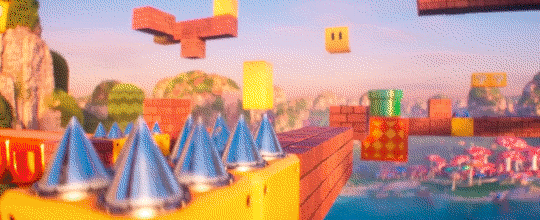

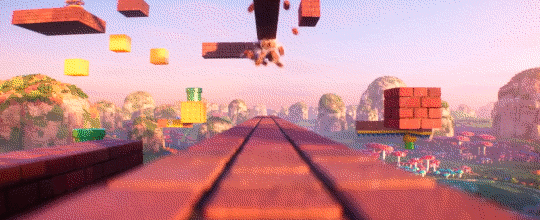
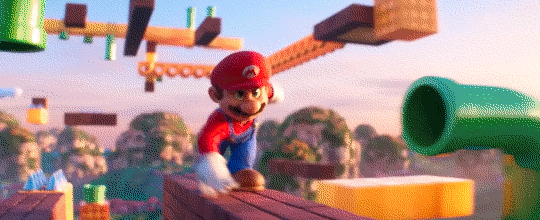

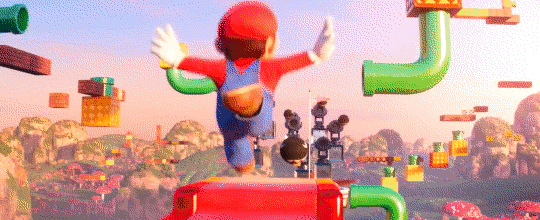

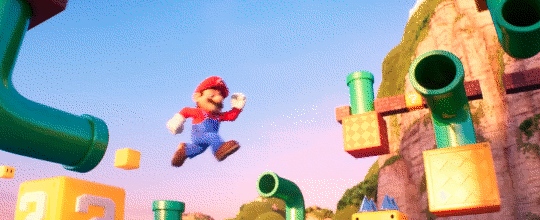
Mario's (nearly) successful training run
#mario movie#mario movie spoilers#super mario bros#super mario bros movie#super mario bros movie spoilers#cherrysip edits#there was a new korean ad that contained this whole scene in HD and i wanted to gif this anyway when the movie came out SO#LOOK AT MY BOY GOOOOOOO#he was doing this on NO sleep having force-fed himself dozens of mushrooms to the point of being sick#because the sun is rising and peach is leaving in the morning and he's going with her no matter what it takes#his brother needs him and he's not gonna let him down!!!!!#(and then he gets a tad overconfident at the end lol BUT HE BASICALLY DID IT. STILL IMPRESSIVE)#and i love that for peach it didn't matter. she saw that he had the determination and the drive and wasn't going to give up#that's all she needed to know. who cares if he didn't touch the flagpole? he fought for it all night long and that's what counts :)
533 notes
·
View notes
Text



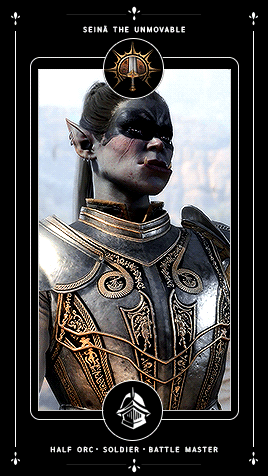

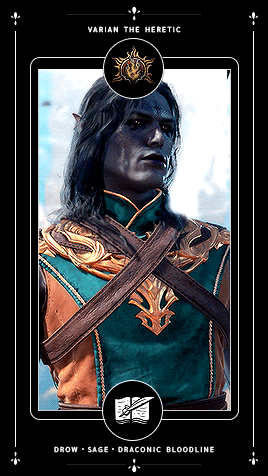

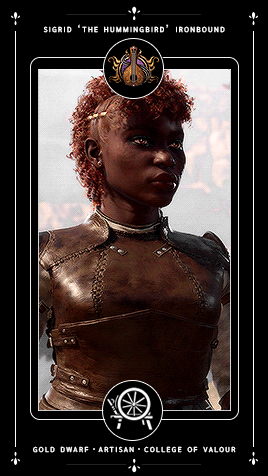

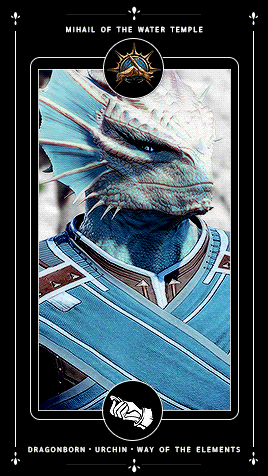
BALDUR'S GATE III › ORIGINAL CHARACTERS 1/?
#bg3edit#tavedit#baldur's gate 3#bg3#gamingedit#bg3 tav#edits#it's impossible to tag them all but i'm glad i finally managed to make this ♥#only took 12 hours and will get 2 notes but! now i have them all in one place at long last#and i can better expand on them between here and google docs#i just know i'll end up with 30+ tavs like i did for dragon age and mass effect#but in the meantime please accept the kids spam ♥
279 notes
·
View notes
Note
what do you think toshiro's version of laios would've been like if he was still with the group during the shapeshifter shenanigans
there have been a few speculations in the tag and among the fans and they are all very good SO i am going to take this opportunity to insert a bit of my shipping bias as i like in my interpretation LMAO agdsfgdfgv
i noted that in actuality shuro seems to have a very good grasp on laios' character??? this is most obvious in the manga later on but even seeing how he criticises laios in their fight... iirc nothing he says is actually untrue or wildly exaggerated, and while he does express frustration over something he feels like laios Should have control over (noticing his cues), he is also aware that laios isnt being malicious and that hes Just Like That. what i mean to say is that while i think his version of laios may seem more pushy and in-your-face, i dont think it will be overwhelmingly so. if its post-fight, i think the idea of laios (and marcille) being willing to do anything to get falin back made a big impression on him, as well as the idea that they need to eat and rest in order to succeed in their goals, so those aspects would be prominent in his version. he seems pretty observant, so i think for the most part the physical traits would line up, but i think there would be specific things that stand out to him that would appear strangely striking on his version of laios (like. idk something about his eye colour or the subtle contrast of his armour and chainmail. he seems to have a weird sense of aesthetics if extras are anything to go by lmao). if hed actually been paying attention all those times laios had gone on about what the hell ever, then it might be even MORE hard to tell apart his version since he would also have a good grasp on what laios should know. so either his version of laios is pretty difficult to pick out, OR despite the character being accurate his appearance is too. stylised lmao (exaggerated features or something) OR!! they just get him to pull out his monster gourmet guide thing and are able to tell from there. iirc everyone was surprised at its appearance so its possible toshiro had also never seen it before
IN MY IMAGINARY SHIPPING SCENARIO............ lets say that his laios isnt able to be picked out immediately and that the monster guide thing also doesnt immediately occur to anyone. what the real laios Specifically notices is how close this other laios keeps getting to shuro. and hes like. ??? why is he getting so close to him, theres no way i get that close to him??? but no one else seems to be picking up on it as weird, so hes having a small crisis like do i REALLY get that close to him???? and now that hes on the outside he notices shuro subtly leaning away and he feels both a wave of shame and..... protectiveness??? (JEALOUSY??????) and he immediately steps in and grabs him like Hey!!! cant you see hes uncomfortable???? weve been through this already!!! and like. ok i cant believe im doing this again but i need to separate this into different endings
a) the whump route: i dont think shuro ever envisioned Actually Telling laios about his frustrations outside of being basically cornered into it. has he ever spoken up against what was expected of him?? has he ever been confrontational???? i think part of what held him back from expressing his frustrations, along with the cultural norms, could be fear of what the reaction would be. if he had done the same in any other aspect of his life (his family, his inheritance), i think he would expect disappointment, disapproval, more proof that he doesnt add up to expectation. to be honest i dont think he Truly believes that laios is the type of person to react like this. but it was strong enough to prevent him from acting and i think would be projected onto his image of laios. maybe fake!laios says something dismissive like Well if it really bothered him hed say something right? what, he cant even stand up for himself? cmon, shuro, prove that you cant handle it just like everything else. and thats pretty much the fastest giveaway that it isnt really laios. of course this would be a HUGE tonal departure from what the actual episode/chapter was, so:
b) the dumbass route: both laioses break into fisticuffs, and, yes.... barking. and so they speedrun the entire encounter as the shapeshifters true form appears and, after laios points out that thinking too hard about others versions of you can tear apart groups and peace of mind, they pointedly do not speak of it again. they think about it though. a LOT
c) the normal route: both laioses argue normal like and the group ends up being able to tell them apart because the fake laios goes on a little too long about how theyre all here for falin and everyones like ok its not like he DOESNT love his sister but.......... the rest of the scenario probably goes like canon, though then i would want to see what everyone Else thought of shuro
#if it had been pre-fight i think shuro must have seen him as someone who wasnt serious enough or was too directionless#it would definitely have been easier to pick him out i think....#i realise that very little actual shipping made it into the scenario. but i hope you see the vision#anon#ask#laishuro tag#if shuro actually ended up having to judge them i cant tell you how accurate he would have been#i DO know that compared to laios he would have been watching their social interactions more carefully#maybe he notices certain habits. i dont know if he would get all of them right though. he definitely gets laios right#long post#huge fucking post even. im so sorry. i hope this answered your question#this is actually shorter than it originally was i took off a paragraph#and.. shorter again because i just revised the final route LMAO#its kinda important that laios is the one that judges so i fixed it. originally i was like well what if shuro judged#which u can kind of tell from the tags above lmao#ok i give up i cant edit this anymore here u go <3
71 notes
·
View notes
Note
do you have any particular thoughts regarding marcille being a half-elf? its interesting to me considering the fact that she seems self-conscious about being a half-elf, but denies it when its brought up
i remember marcille looking visibly uncomfortable over laios simply asking her how old she is, which i think the only reason she might feel nervous about this is because it might reveal her as a half-elf to him.
she's never corrected anybody whose called her an elf either.
never mind the circumstances of the reveal, in which thistle goes on about how half-elves are inferior and accusing her of wanting to become full blooded elf, she seemed particularly upset like he struck a nerve-
i wish the half-elf thing was built upon more. also, underrated marcille line:
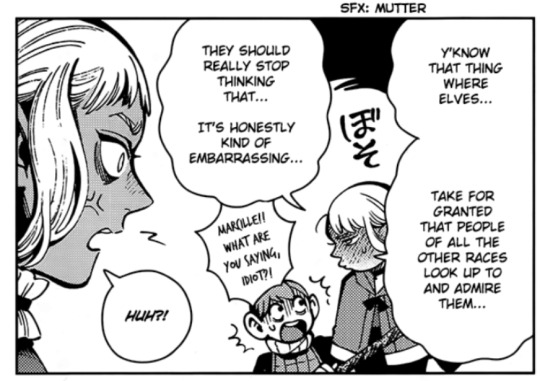
okay so i revisited this sequence just to make sure I could back myself up and it's just... man. there's a lot going on.
the first reaction we get from Marcille is this huge panel that takes up half of the page
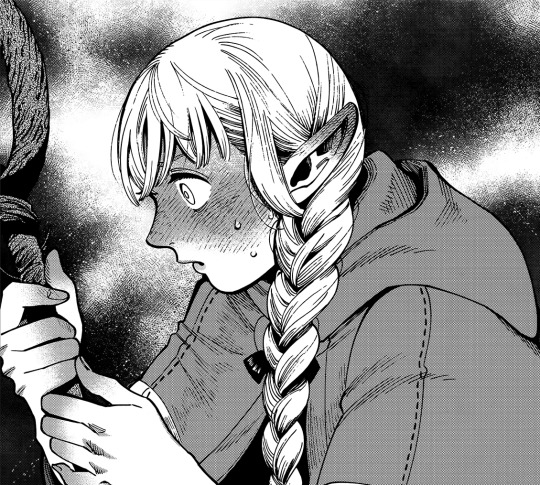
she is viscerally affected. flushing to the tips of her ears with the intensity of it. and we see it again, a few pages later
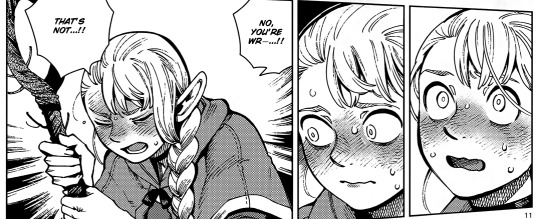
so it might seem like she's embarrassed about it and lying to herself, but... I really think it's just that Thistle is accidentally hitting sore spots. If you really look at what he says to get these reactions
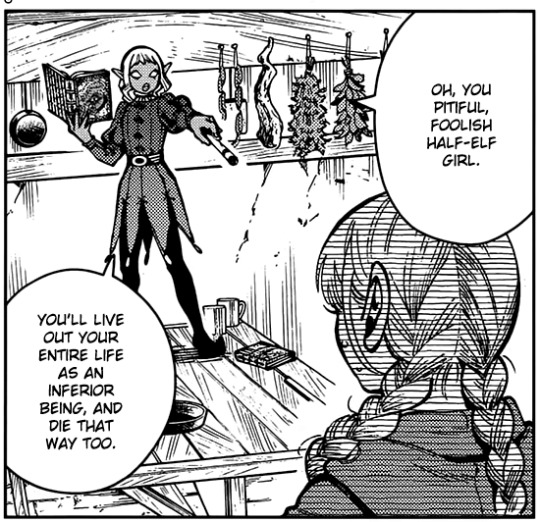
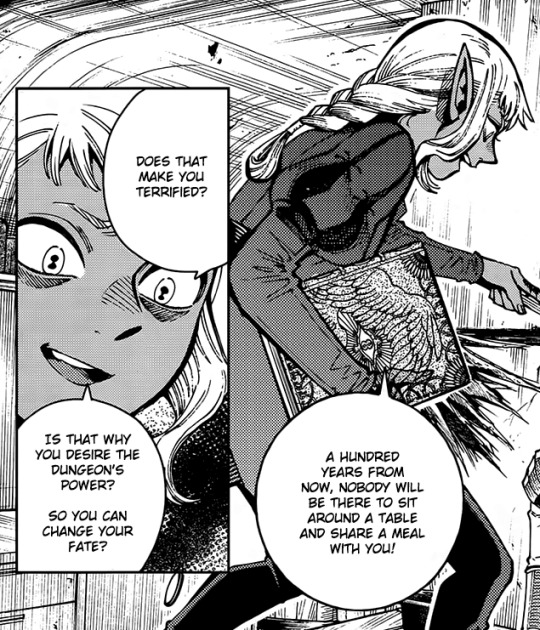
"you'll live out your entire life [...] and die that way too"
"a hundred years from now, nobody will be there"
Hear me out. I think, if he stuck to harping on about her inferiority without bringing up how terrifyingly long-lived she is, she wouldn't have been as bothered. But right now, Thistle is accidentally hitting all the marks on Marcille's deepest fears-- and this is after the Winged Lion promised her that her dreams could come true in an extremely vulnerable moment, so it also hits her slightly guilty conscience as well.
I do truly believe that Marcille isn't bothered about being a half-elf the way that people assume she'd be bothered by it. To her, the biggest problem with being a half-elf is that it's isolating.
On one hand, it's not hard to imagine why she'd distance herself from elves in the west. A lot of them can clock her as a half-elf on sight, unlike other races, and therefore she's always branded with this weird stigma of being Othered -- I would even say that she considers herself lucky for being born outside of elven culture instead of having to grow up in it. I mean, just... look at the way elves talk about her.
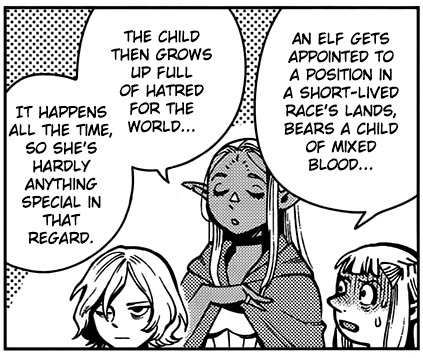

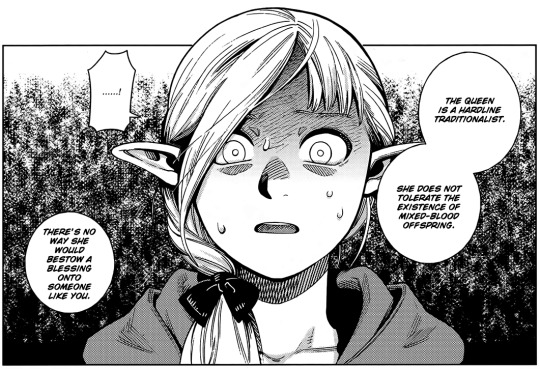
Skipping past the uncomfortable implication of what 'not tolerating the existence' of half-elves would actually entail, this is incredibly fucking annoying. You can see why she wouldn't want to be around elves much. You see a lot of Marcille reacting badly here, but honestly, almost all of it can be attributed to her freaking out that her bluff completely failed. She's honestly more paying attention to Izutsumi's footsteps and trying to coordinate an opportunity to escape.
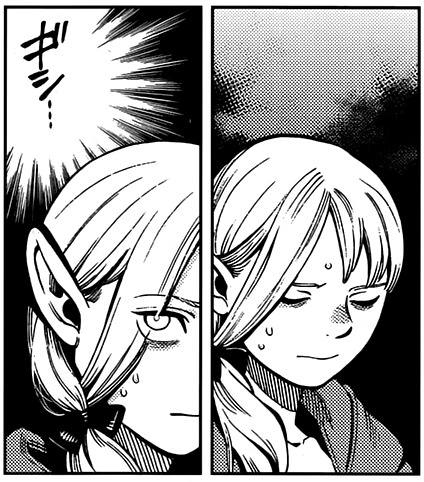
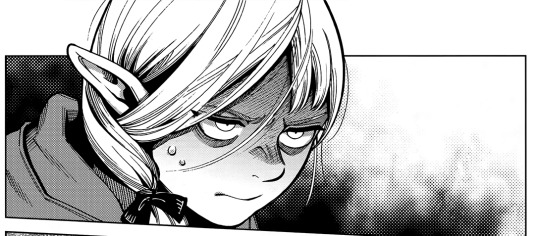
And in the end, you see her built-up frustration at being asked if she wants to be a full-blooded elf like 2-3 times in a row.
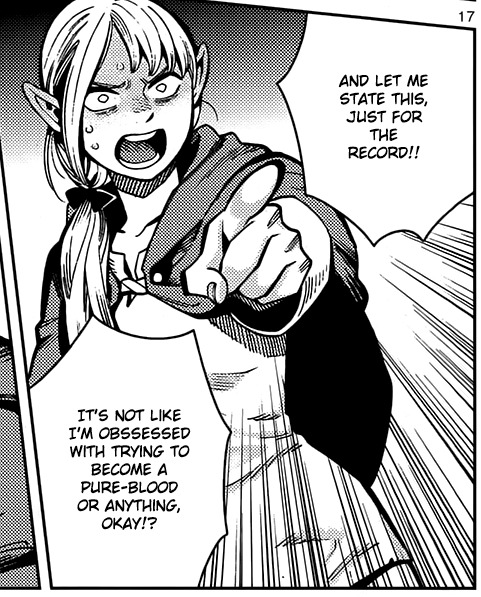
Yeah, yeah, "the lady doth protest too much," and all. But we know Marcille. We know that she's a lot more embarrassed and horrendously unconvincing when she's being prodded about something she's actually self-conscious about.
Moving onto the flipside of things, it might seem weird that she "pretends" to be a full elf around other races, but it's not really that strange if you think about it. Again, people are weird about her being infertile or whatever, and a lots of them don't even know much about what sets half-elves apart from everyone else. I mean, look at how uncomfortable Laios is just asking her about it
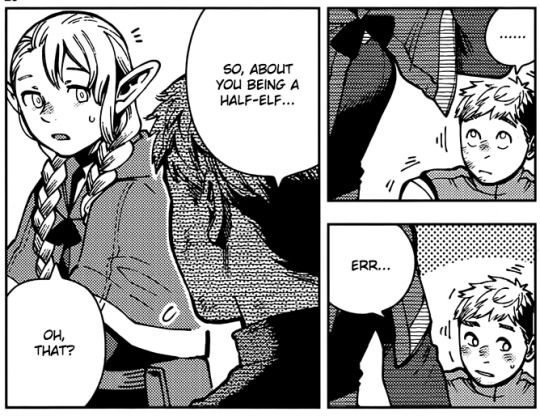
and look at how exasperated and resigned she looks
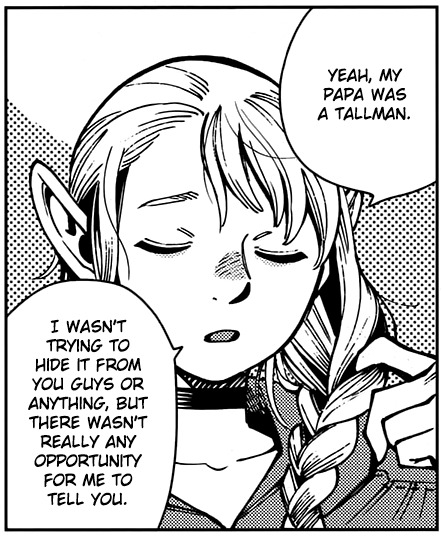
And like... she's right. Where would that come up in normal conversation? Why would she go out of her way to tell them? She's functionally a normal elf to other races anyway -- got the ears, the abnormally long "childhood", and the huge mana capacity. Unless it's directly relevant or important for people to know, I don't think it's all that strange or indicative of insecurity that she prefers not to bother with it.
(This combined with her sense of being an "outsider" to elf culture also explains why she thinks elf superiority is embarrassing. She sees the way elves treat short-lived races from the "outsider" perspective nonetheless, and thinks it's obnoxious; especially more so because she usually has to play the elf around short-lived races and deal with the reputation of arrogance that elves have built up.)
The sad thing is, this all means that... she doesn't actually fit in anywhere. She doesn't like going out West much because of how elves treat her. But she's also an outsider in the continents she was born in, treated like this exotic long-lived alien choosing to live among short-lived races for some reason. She is always an outsider, the Other, no matter where she goes. Add in the fact that she'll live longer than literally anyone she knows, and it's honestly kind of heartbreaking.
And I think that's the crux of it. Marcille really doesn't act like she's at all self-conscious about being a half-elf because of any feelings of inferiority or being half-made or whatever. She considers herself a perfectly legitimate being and might even, in some ways, consider herself superior to normal elves because she's not blind with elf supremacy or whatever. (And whatever "elven biases" she displays, all of them are born more out of the fact that she's kind of bad at conceptualizing how other races age and mature compared to herself, not that she actually considers herself better or more mature simply for being an elf.)
I think that whatever self-consciousness Marcille has about being a half-elf is, instead, related to terror and loneliness. The reminder that it ensures she'll never truly belong anywhere for the rest of her very long life. The reminder that, in truth, even she's not actually sure how old she is by other races' standards (hence the discomfort when asked how old she is). She doesn't want to not be a half elf, or be a full elf or full tall-man-- in her ideal world, she's still a half-elf. She just gets to live out her life at the same pace with the people she loves and doesn't have to say goodbye again and again and again until she dies.
and one last very important panel, right after Mithrun tells her that all her desires would be devoured
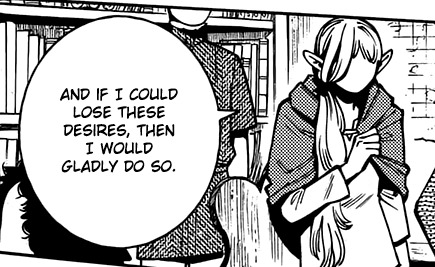
In her ideal world, she's still a half-elf and reality magically starts marching at her pace. But failing that, the second best thing is that she's still a half-elf-- but one who is able to accept reality and let go of her fear.
(But the rest of the story pans out the way it does because, to Marcille, taking reality apart and reshaping it was less scary than simply and fully reconciling with it.)
#asks#dungeon meshi manga spoilers#marcille donato#manga panel analysis#this is probably riddled with typos sorry#readmore cut bc it got long lmao#i ended up babbling about it bc it's such an important character detail to me#bc like... wow. she's so normal about it. she's literally just chilling.#the only thing that really bothers her is the material reality of it and how people treat her#the stereotypes the stigma etc. etc.#otherwise it just..#literally doesn't factor into her criteria for self-worth at all#the basic truth is that marcille likes herself on a fundamental level#she's not plagued by a deep and festering self-loathing the way a lot of characters in her archetype are#she likes herself and is proud of her successes and accomplishments#its just that shes terrified of failure and can have *episodes* of self-loathing when she fucks up#but who doesn't yknow#i know its a very slight nuance that makes very little difference in how her 'overachiever' problems manifest but its there#the sword of abandonment issues that hangs over her head has nothing to do with her self-worth or self-esteem or meeting her own standards#it has to do with the fear of not living up to *other* people's expectations and not being useful enough to be worth keeping around#she's good enough for herself but she's always so so so scared that she's not good enough for other people#i wont say much about what ryoko kui is saying using this as an allegory for real world racial biases but#dungeon meshi's treatment of marcille's relationship with her being half-elf is so incredibly important to me because it gets it so right.#a trauma about inferiority or being a half-being isn't inherent to the experience of being 'of two worlds' at all#that's something that's unfairly drilled into people by their environment#the *inherent* anguish is the loneliness. the constant longing. the fact that you are always homesick no matter where you are#always just a little bit of an outsider and never fully at home#and dungeon meshi gets that.#edit: cleaned it up a little
102 notes
·
View notes
Text
i think its very fun to consider the mc as another king like obviously not the same way as the devil kings but in two ways: one being that you are the descendant of the wise king, solomon, and what he had has been inherited by you, but also as in the mc having rule over a very small, but wholly devoted kingdom.
and by that i mean minhyeok.
sure it was a kids game, him swearing his loyalty to you and you ordaining him as your knight, but that kids game became his reality. he is your only subject but he will never leave you. whatever he can do to protect you, he'll jump to it in a heartbeat even if in the end it costs him his life. but a king cannot be a king with no one to rule, which is why when it was your turn to save him there was no hesitation to literally make a deal with the devil to keep him alive. and he will wait as long as it takes until you return and he can be by your side again
#cliffnotes/.txt#whb#what in hell is bad#ive been rotating loyal/minhyeok stuff in my head ugghhhghh#also funny i named my mc that before i knew what was going down in the game. thats just what i picked before starting#ive never changed it either#i just knew ☝🏽#i also like to think of this as being something that puts the mc on more level footing with the others bc of solomons influence but also#their own role playing king since childhood#how long does an actor play a role before its no longer just a role yknow#when the curtains wont drop it starts to become reality because theres no one else you can be. the play isnt ending#because somewhere along the way it stopped being just a play. its a way of life now#edit: i forgot to say but the knighting thing is in one of minhyeok's side stories!#i believe in ch2 or 3 i went to find the screenshots to make sure i didnt make up that convo in my head#then forgot to check where it actually was.
88 notes
·
View notes